What’s on your European bucket list?
From world class museums and ancient archaeological sites to stunning natural wonders, Europe boasts a diverse array of attractions that attract millions of visitors every year.
The Colosseum, the Eiffel Tower, and the Acropolis top the list for many first time visitors to Europe, but you can also explore the fjords of Norway, get a history lesson at Pompeii, and cruise through the canals in Venice.
This list includes many of the most popular tourist attractions in Europe. These famous spots attract huge numbers of visitors each year, so if you are the type of traveler that prefers quieter, off the beaten path places, this list may not be for you.
However, these sites are popular for good reason. With their history, their beauty, and their iconic status, these places frequently make the must-see list for many travelers.
Join us as we journey through the top tourist attractions in Europe and give you tips on exactly how to visit them.
About this List of Places to Visit in Europe
We have chosen 30 of the most popular and most visited Europe tourist attractions. These cover everything from famous museums to historical sites to a few natural wonders.
As visitation to Europe increases, many of these places not only have an entrance fee, but there is a very good chance that you will need to purchase a timed entry ticket in advance. When this is necessary, we’ll let you know how to do this.
We have visited every site on this list so we can give you firsthand and updated information about how to plan your visit. 30 attractions may sound like a lot, but there were many more places we could have added to this list.
At the end of this guide, we have a list of 10 more tourist attractions that are still very worthwhile, but for various reasons did not make our must-see list. We’ll also share itineraries and tips to help you plan the perfect trip to Europe.
Top Tourist Attractions in Europe
In no particular order, here are 30 of the top tourist attractions in Europe to visit (although we do start off with a few of the most famous).
1. Colosseum
Let’s get started with one of the most visited tourist attractions in Europe.
The Colosseum is one of the New Wonders of the World and a UNESCO World Heritage Site. Completed in 80 AD, it is also one of the oldest sites on this list.
When it was built, the Colosseum was the largest amphitheater in the world. It could hold up to 80,000 people, spectators who were drawn here to watch gladiatorial contests, executions, animal hunts, and re-enactments of famous battles.
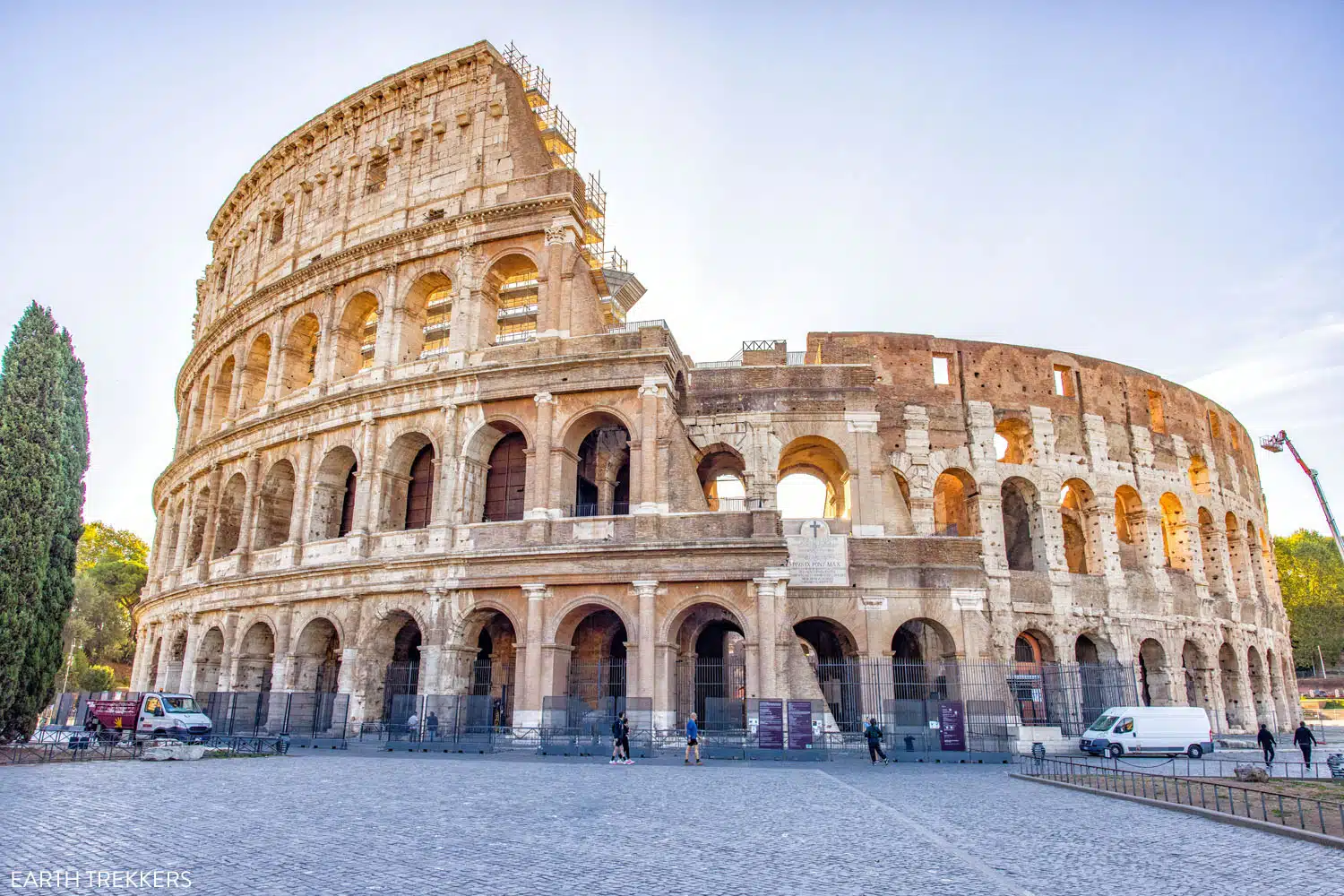
How to Visit the Colosseum
Location: Rome, Italy
Top Experiences: Visit the multiple levels of the Colosseum, enjoy the view from the Arena Floor and the Attic, take a guided tour of the Underground, and visit the museum. A ticket to the Colosseum also includes the nearby Roman Forum, another must-see in Rome.
Tickets: Tickets are sold online in advance. Visitors will make a reservation for a timed entry spot. Due to the popularity of the Colosseum, tickets sell out almost as soon as they are released. Ticket and tours can also be purchased through 3rd party sellers.
LEARN MORE: Read our guide How to Visit the Colosseum for more information, including ticket types, how to purchase your tickets, plus many more photos.
2. The Eiffel Tower
For many, a trip to Paris would be incomplete without a visit to this iconic landmark.
When it was completed at the end of the 19th century, the Eiffel Tower was the tallest man-made structure in the world. It was only intended to stand for 20 years. However, it became such an important tourist site, and a valuable radiotelegraph station, so it was never dismantled.
Now, the Eiffel Tower is one of the most visited monuments in the world.
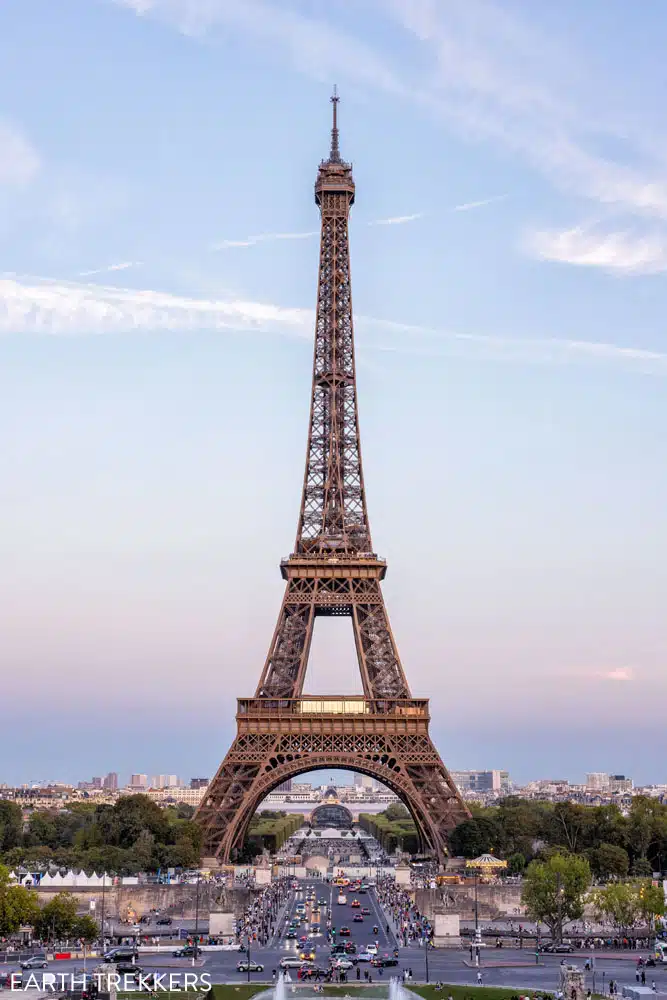
How to Visit the Eiffel Tower
Location: Paris, France
Tickets: For the best experience, purchase your entry ticket online in advance. Tickets can be purchased onsite, but during peak season, you risk wasting several hours in the ticket line, not how most people prefer to spend their valuable time in Paris.
Which Level(s) should you visit? On a visit to the Eiffel Tower, you can visit all 3 levels or just one or two. To save your steps, book an elevator ticket. Those who want more exercise (or want to save money) can walk the steps from ground level to the second floor. We love the view from the second level. In our opinion, the 3rd level is only worth it if you have extra time and money to spend.
Learn More: In our article How to Visit the Eiffel Tower, we cover everything you need to know to have the best experience.
3. The Acropolis
The Acropolis is the centerpiece of Athens, Greece.
The buildings that still stand today were constructed under the direction of Pericles in the 5th century BC. The Parthenon is the most recognized of these buildings (and one of the most imitated buildings in the world), but the Acropolis is also home to the Temple of Athena Nike and the Propylaea.
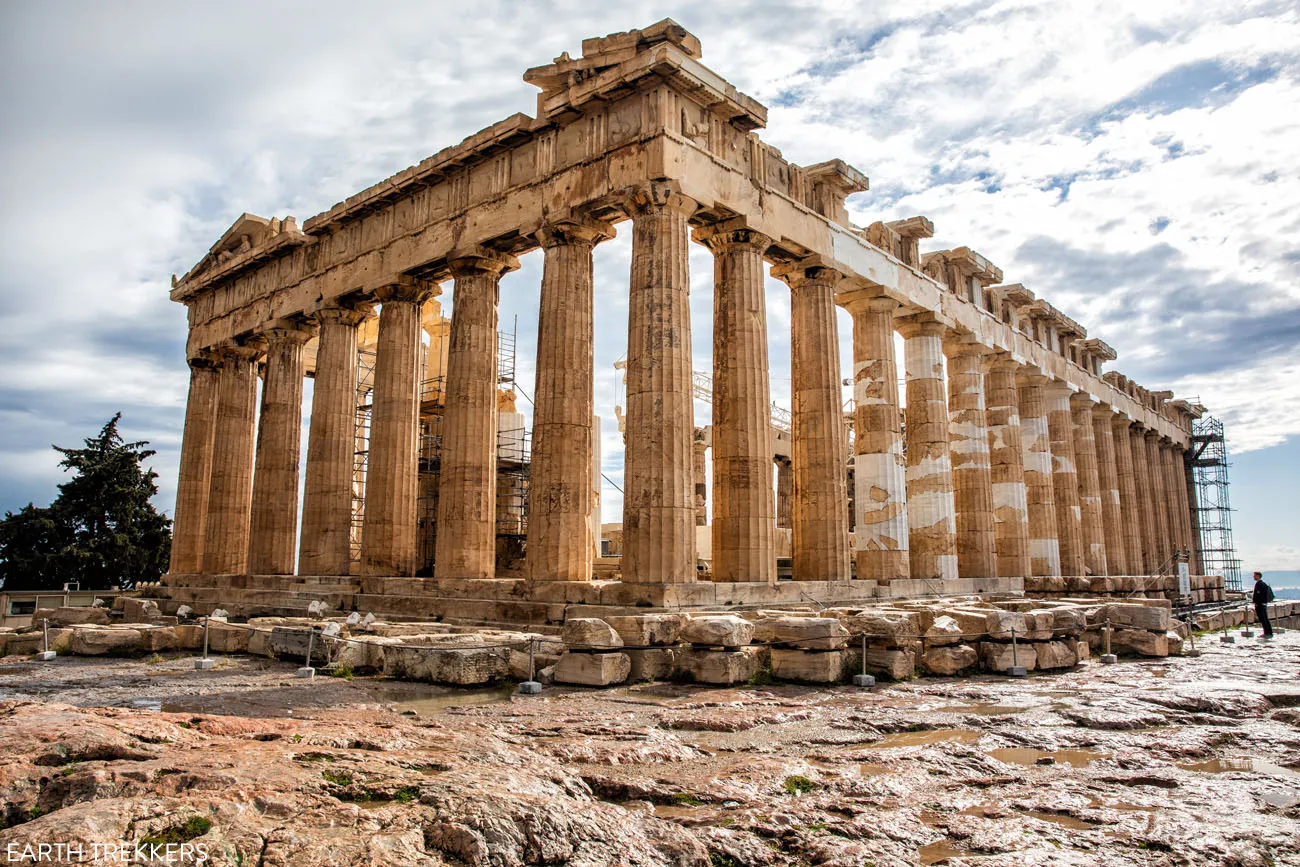
The Parthenon | Tourist attractions in Europe
How to Visit the Acropolis
Location: Athens, Greece
Things to See at the Acropolis: The sites on the Acropolis are organized into two areas, the Acropolis and the slopes. The sites on the Acropolis include the Propylaea, the Temple of Athena Nike, the Parthenon, and the Erechtheion. Those on the slopes are located on the south side of the Acropolis and include the Odeon of Herodes Atticus and the Theater of Dionysus.
Tickets: To avoid the wait in the ticket line, purchase your ticket online in advance. You will book a timed entry slot into the Acropolis
Learn More: How to Visit the Acropolis & Parthenon
4. The Louvre
The Louvre is the largest art museum in the world. In 2023, it was the world’s most visited museum (with the Vatican Museums taking the #2 spot), with 8.9 million visitors.
With that being said, the Louvre draws enormous crowds. Many people come here for a glimpse of Da Vinci’s Mona Lisa, but several other art pieces, such as Venus de Milo and the Winged Victory of Samothrace, are also extremely popular.
A visit to the Louvre is more than just gazing at a few famous works of art. It also has a long, rich historical background and was once the palace of French Kings.
The Louvre started out as a fortification, became one of the most extravagant palaces in Europe, and in 1793 during the French Revolution, was converted into a public museum.
The Louvre contains over 600,000 works of art, of which roughly 35,000 are on display. These works of art span almost 10,000 years. The exhibition area inside of the Louvre is an incredible 73,000 square meters (783,000 square feet). It would take weeks to see every piece of art on display.
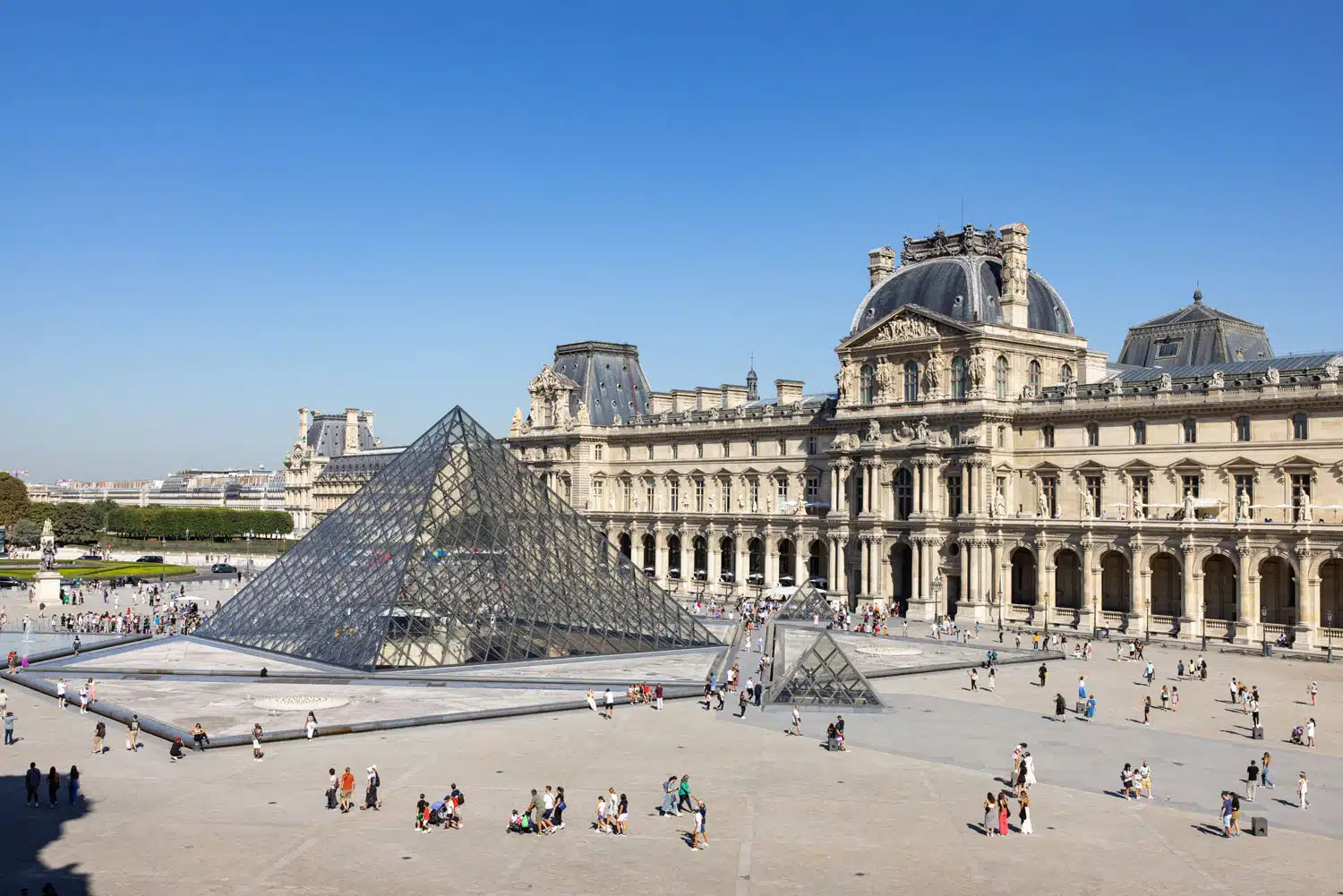
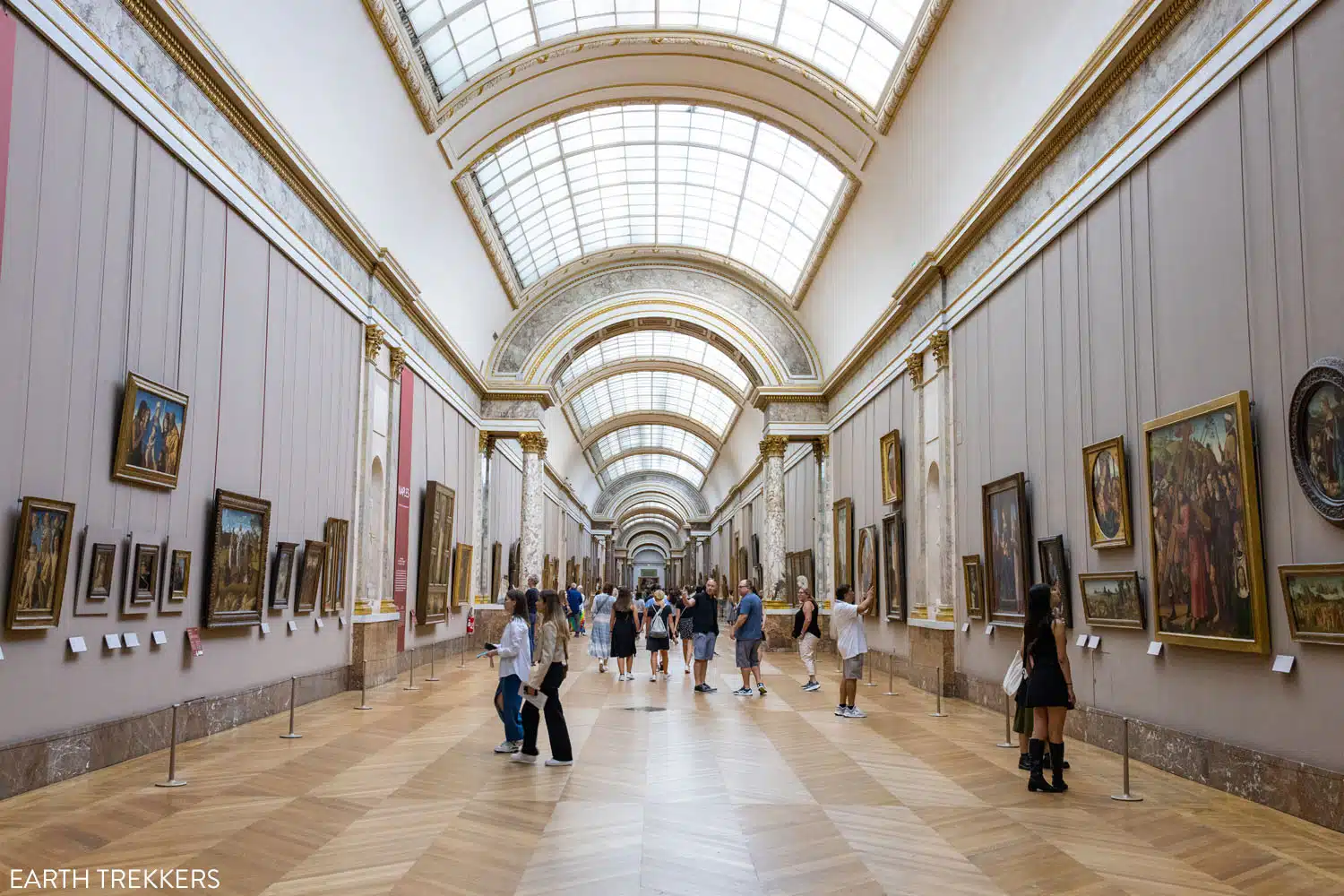
How to Visit the Louvre
Location: Paris, France
Walking Tour & EBook: We have a detailed Guide to the Louvre and eBook, which includes a walking tour to the most famous works of art and continues deeper into the Louvre, an optional add on for those with more time and want to see a few amazing hidden gems.
Tickets: Purchase your tickets online in advance to avoid spending hours in line.
Top Experiences: The Mona Lisa, Venus de Milo, and the Winged Victory of Samothrace are the three most famous things to see, but other notable works of art and rooms include the Wedding Feast of Cana, Liberty Leading the People, the Grande Galerie, Medieval Louvre, the Code of Hammurabi, and Napoleon III’s Apartments.
Visit both the Louvre and the Eiffel Tower with three days in Paris.
5. The Canals of Amsterdam
Amsterdam is famous for its maze of canals.
Fanning out from the city center are a series of horseshoe-shaped canals. Singel was the first of these canals and was originally the moat that surrounded the main city center.
Three more canals form the core of the canal ring: Herengracht, Keizersgracht, and Prinsengracht. Like spokes on a wheel, these canals are bisected by streets, bridges, and smaller canals.
The western section of the canal ring is the most scenic. This is the location of De 9 Straatjes, or The Nine Streets. These nine little streets are a haven of boutique shops, cafes, art galleries, and restaurants. You can very easily spend an afternoon here, hopping from shop to shop. Even if shopping is not your thing, this area, with its jumble of canal houses and cobblestoned streets, is a delight to explore.
These canals were declared a UNESCO World Heritage Site in 2010.
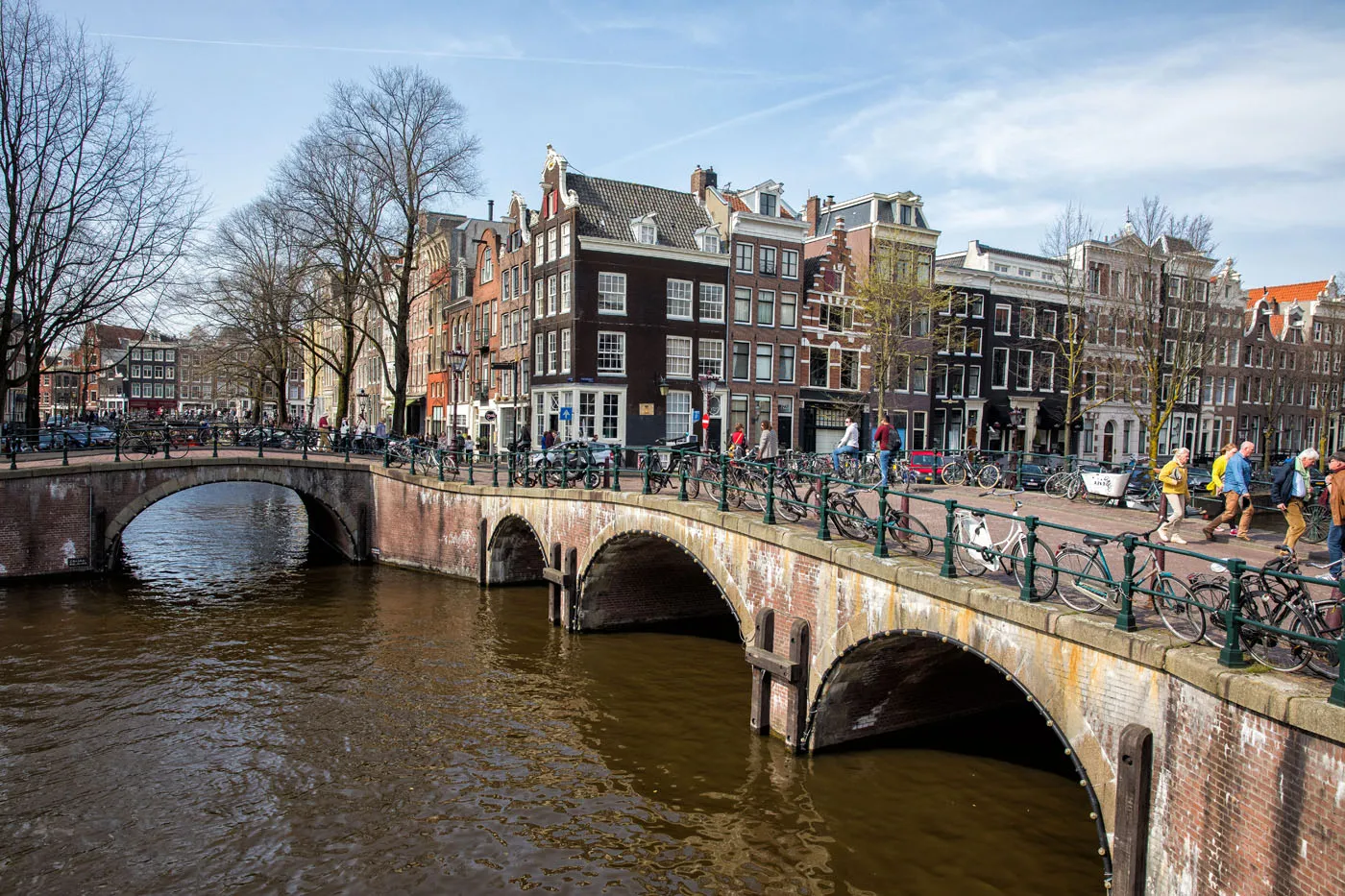
How to Visit the Canals of Amsterdam
It is free to visit the Canals of Amsterdam. Visitors can walk, bike, or cruise along the canals. Staying on one of these canals and having lunch or dinner in outdoor café also top the list of the different ways to experience these canals.
Located on the canals is another important tourist attraction in Amsterdam, the Anne Frank House.
Plan your visit with our 2 Days in Amsterdam Itinerary.
6. La Sagrada Familia
The Sagrada Familia is Barcelona’s most famous tourist attraction. It is the most unique church we have ever seen.
The Sagrada Familia is a Roman Catholic church designed by Antoni Gaudí. Although it is still under construction, this church is a UNESCO World Heritage Site. Construction is forecasted to be completed by 2026.
From the outside, the front of the church looks like a sandcastle that is slowly crumbling into the ocean. Inside, it is modern, colorful, and whimsical, like so much of Gaudí’s artwork in Barcelona.
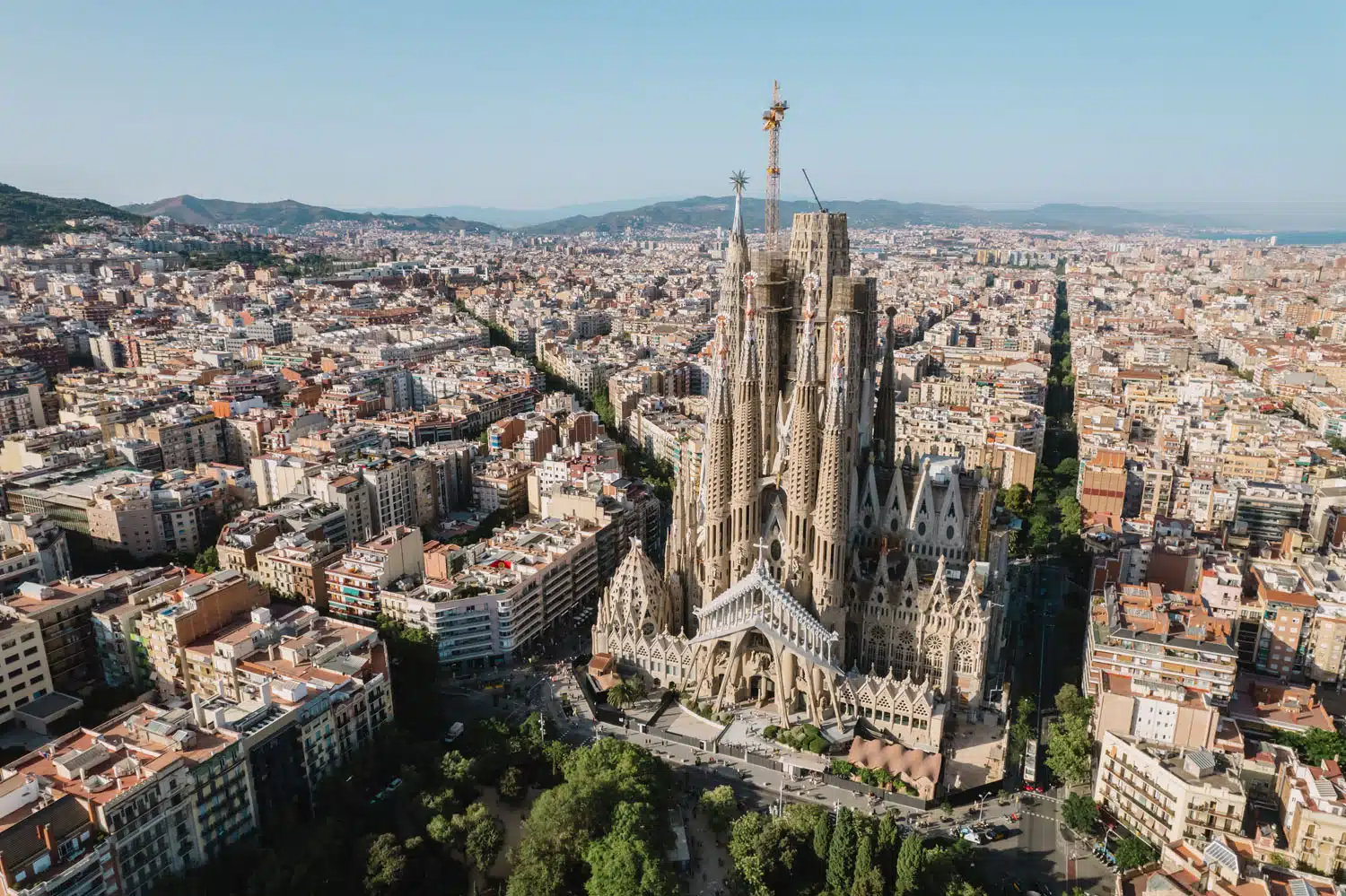
Aerial view of La Sagrada Familia | shutterstock.com
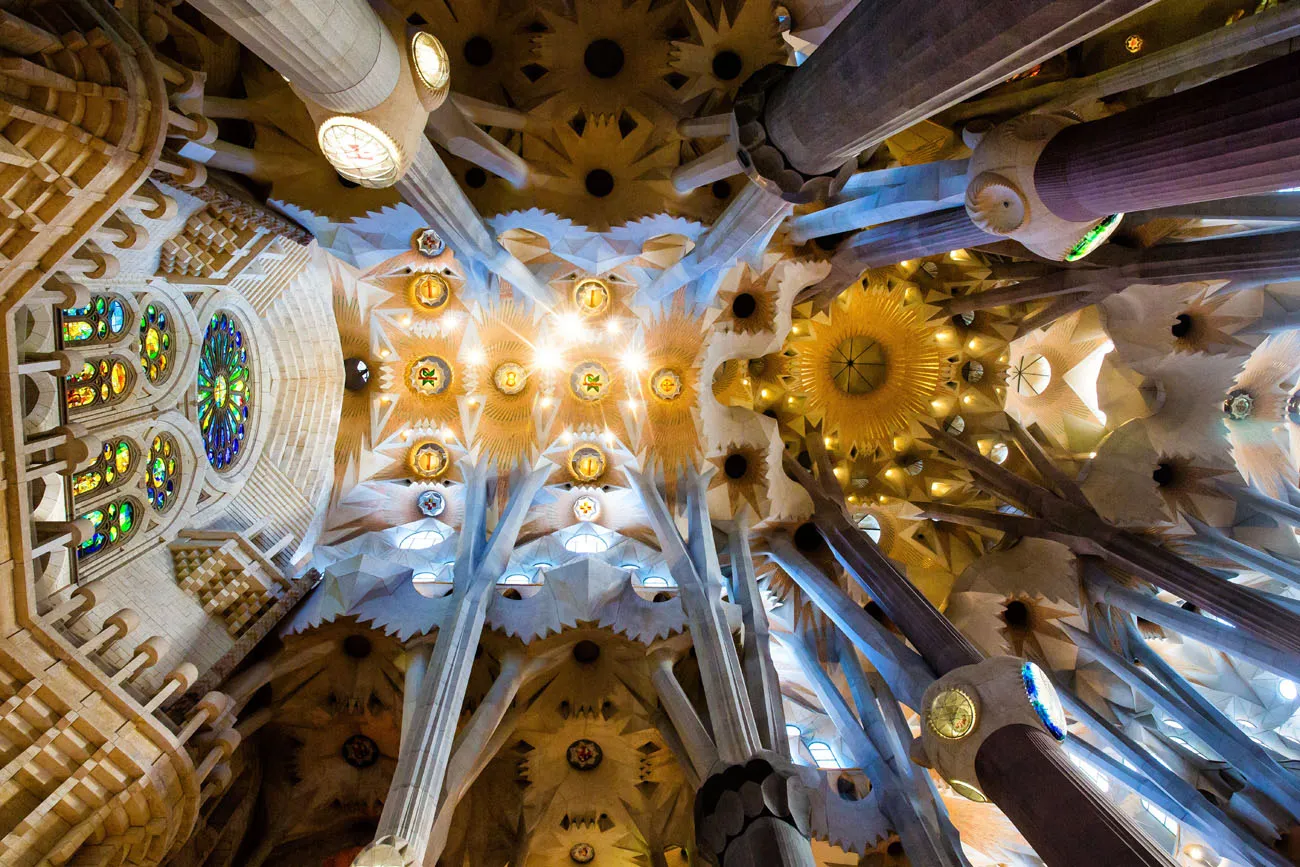
Interior of La Sagrada Familia | Tourist attractions in Europe
How to Visit the Sagrada Familia
Location: Barcelona, Spain
Tickets & Things to Do: There are several options for visiting the Sagrada Familia. The basic ticket allows you to visit the interior of the church without a guide. You can spend more money to add on an audio guide, a guided tour, a visit to the Gaudí House Museum, and/or climb one of the two towers. Purchase your ticket online in advance.
Learn more: Plan your visit with our 3 Days in Barcelona Itinerary.
7. Big Ben & Tower Bridge
Yes, I just listed two attractions. London is filled with iconic buildings, with Big Ben and Tower Bridge being two of the most popular. Other sites that could have made this list include the amazing Westminster Abbey, Buckingham Palace, and St. Paul’s Cathedral.
Big Ben
For a first timer in London, it’s thrilling to get that first glimpse of Big Ben. Big Ben is the name for the largest of the five bells inside of the clock tower but nowadays, the nickname Big Ben includes both the bell and the clock tower.
This iconic tower sits on the north end of the Houses of Parliament. It is a UNESCO World Heritage Site. Currently, only UK residents are allowed to tour the inside of Big Ben.
One of the best places to get a view of Big Ben is from Westminster Bridge, where you can photograph Big Ben along with the iconic red double decker buses, black taxis, and views of the Parliament building.
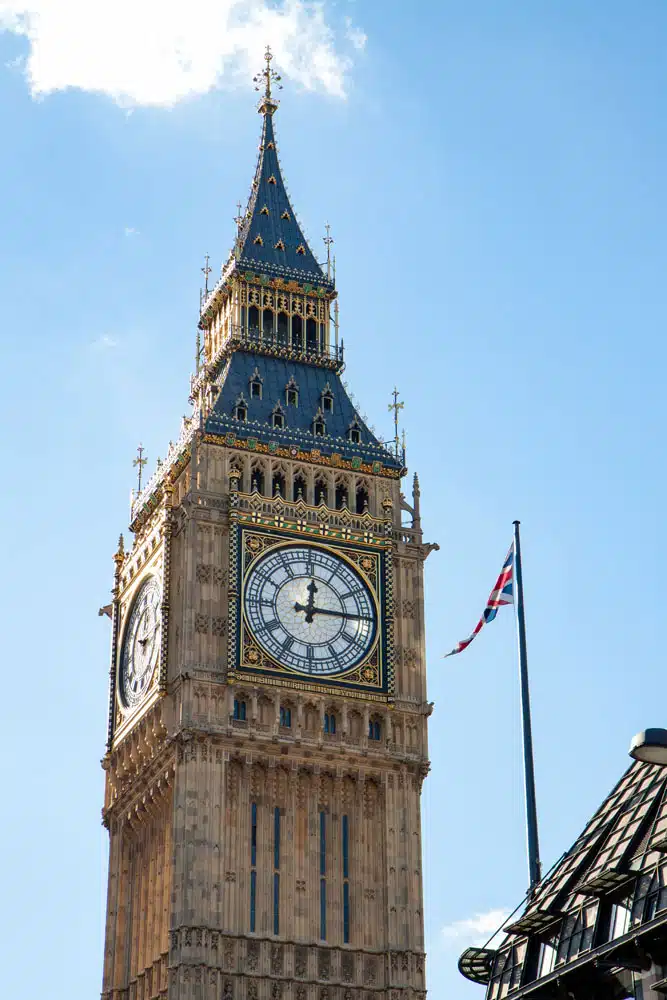
Tower Bridge
This London icon was constructed in 1894 to complement its neighbor, the Tower of London (yet another popular tourist attraction in London). Getting a view of this bridge is one of the best free things to do in London but for a small fee, you can climb the towers of the bridge.
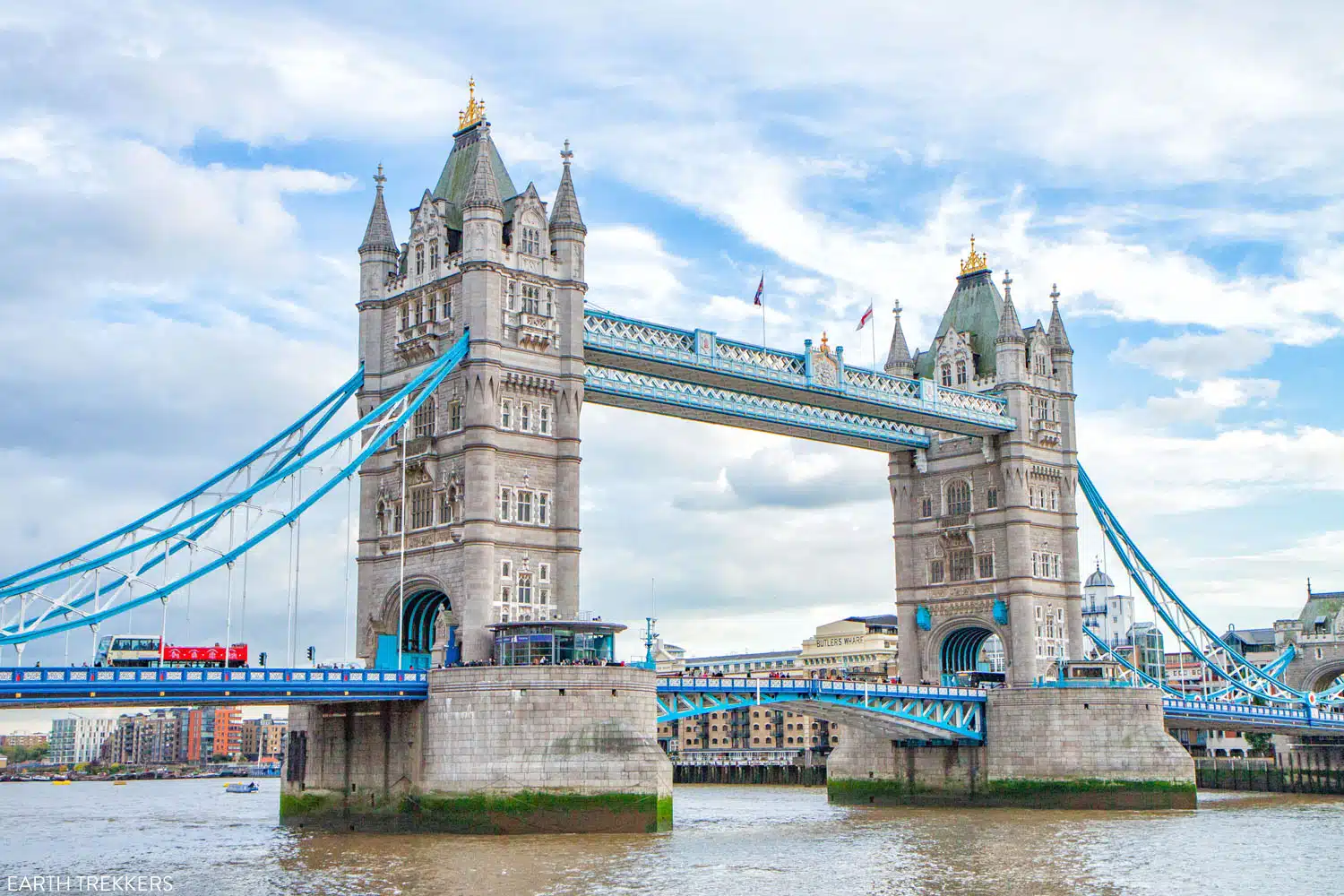
LEARN MORE: See more of London’s amazing sights in our London Bucket List and plan your trip with our 5 Day London Itinerary.
8. The Fjords of Norway
Carved by glaciers and lined with waterfalls and tiny villages, the fjords of Norway are one of the most picturesque places to visit in Europe. Connecting these small towns by car is one of Europe’s best road trip destinations and active, adventurous travelers can make the trip even more memorable by adding in some truly epic hikes.
There are more than 1,000 fjords in Norway and some of the most famous are located in the southern half of the country. Naeroyfjord, Hardangerfjord, Lysefjord, and Aurlandsfjord are some of the most famous, and gorgeous Geirangerfjord is a UNESCO World Heritage Site.
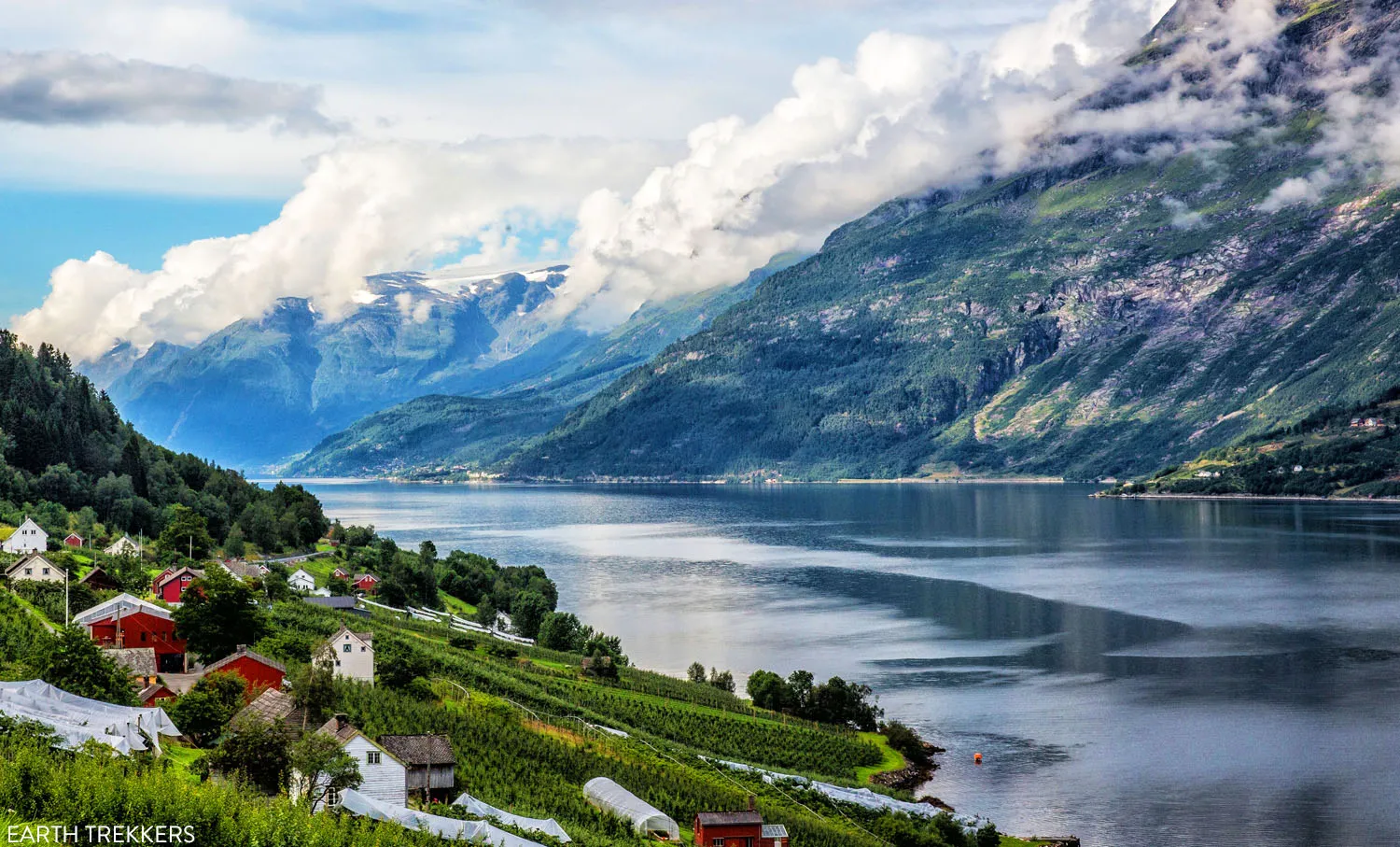
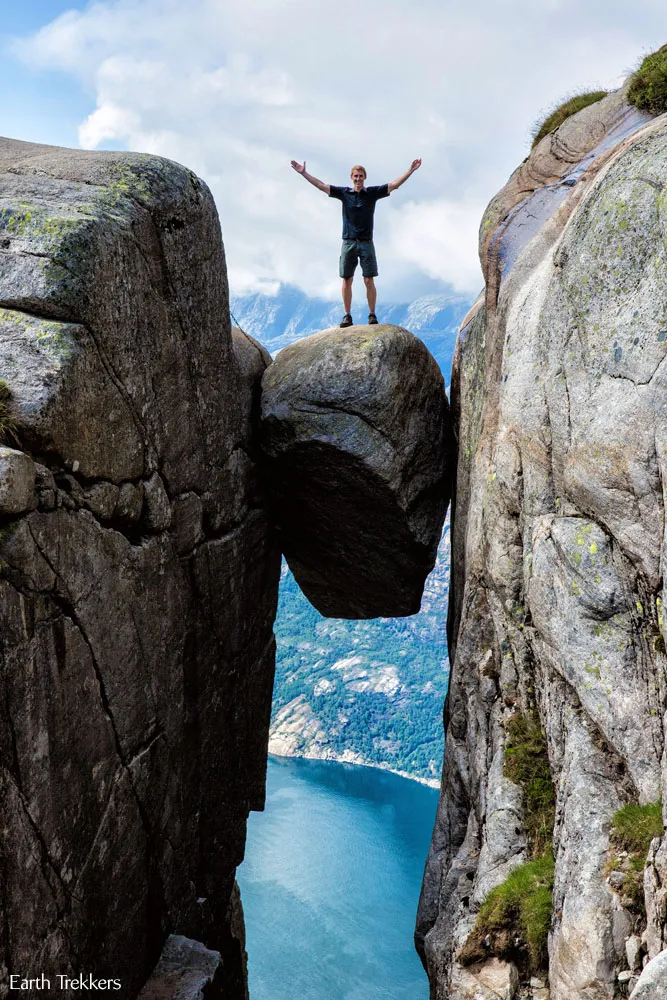
Kjeragbolten
How to Visit the Fjords of Norway
You can explore the fjords by boat, by train, by car, and on foot. Norway in a Nutshell is a tour that combines a cruise on the fjords with a scenic drive and one of the most beautiful train journeys in the world.
Learn how to plan your road trip, and add in some of Europe’s top hikes (Trolltunga, Pulpit Rock, and Kjeragbolten), in our 10 Day Norway Itinerary.
9. The Old Town of Prague
During World War II, Prague was one of only a few cities that survived with minimal bombing, leaving its historic buildings and cultural treasures intact. What remains are its original Gothic towers, cobblestoned streets, and hundreds of church spires.
The Old Town of Prague is filled with historic charm. In just a few hours, travelers can visit Old Town Square, stroll the historic streets, climb a Gothic tower or two for a bird’s eye view of Prague, and go for a walk across the Charles Bridge, one of the most famous pedestrian bridges in Europe.
Prague is also home to Prague Castle, the largest castle complex in the world.
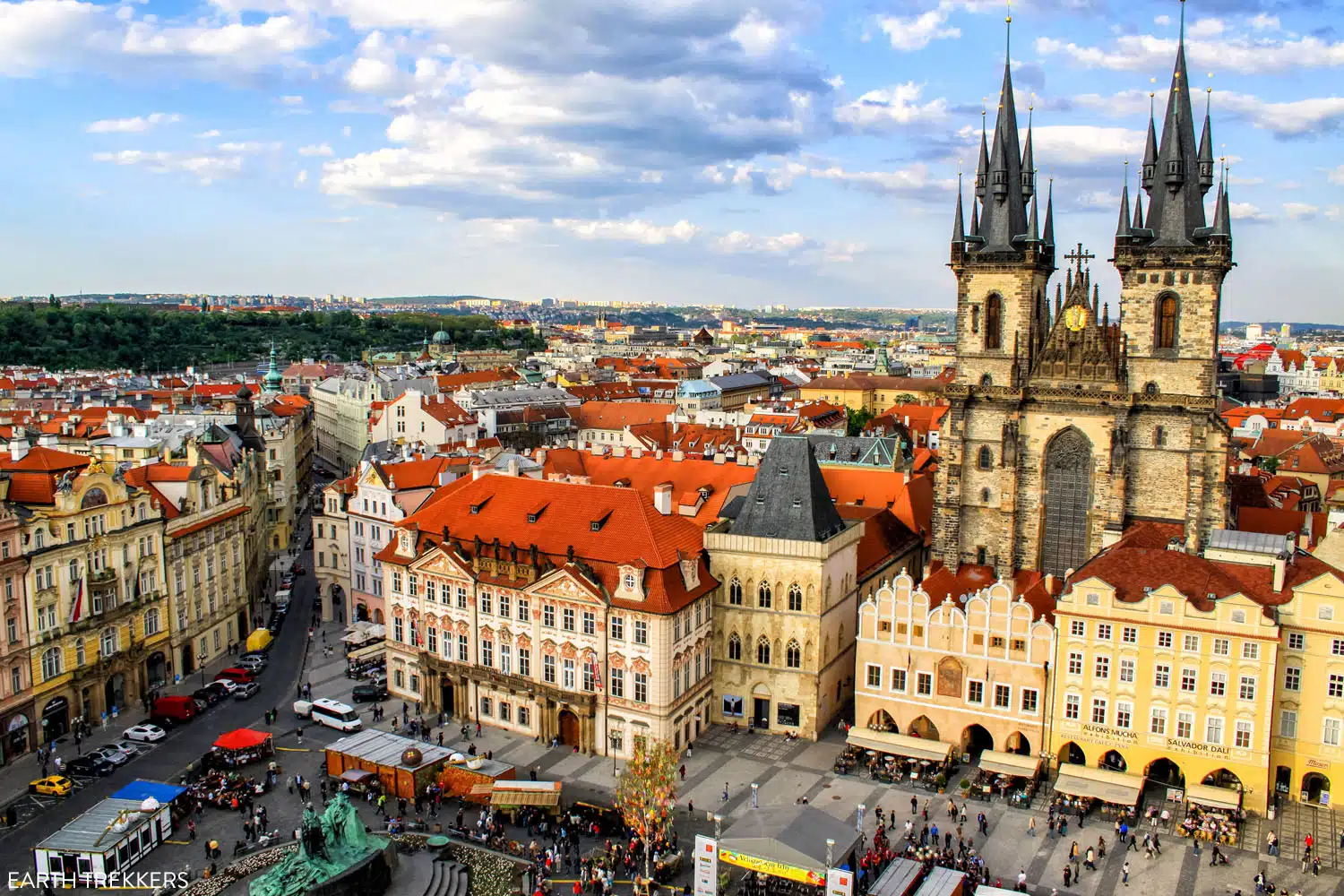
Plan Your Visit to Prague, Czech Republic
30 Amazing Things to Do in Prague
How to Spend 2 Perfect Days in Prague
Best Views of Prague: 10 Iconic Photography Locations
10. Neuschwanstein Castle
Neuschwanstein is a fairytale palace in Bavaria, Germany. It was constructed in the 19th century by King Ludwig II of Bavaria as a retreat. The palace was never completed and soon after his death, it became a tourist attraction. Neuschwanstein was Walt Disney’s inspiration for Cinderella’s castle.
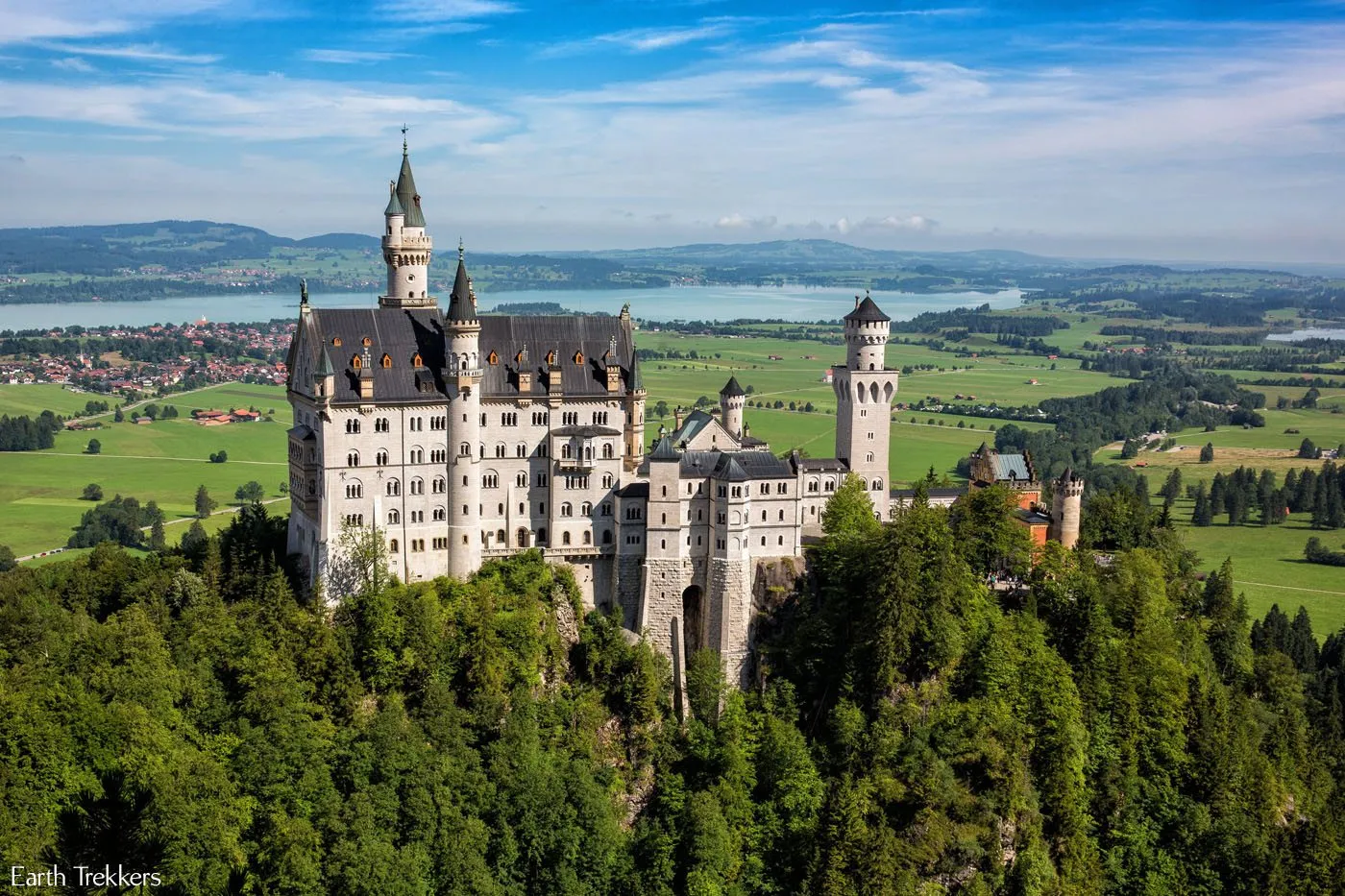
How to Visit Neuschwanstein Castle
Location: Bavaria, Germany
Things to do in include taking a tour of the palace, viewing the castle from Mary’s Bridge and nearby hiking trails, and visiting nearby Hohenschwangau Castle.
For the best experience, purchase your tickets in advance on the official website and visit early or late in the day for the lowest crowds.
Learn more in our Guide to Neuschwanstein Castle.
11. Pompeii
In 79 AD, the city of Pompeii was buried in ash following the eruption of Mt. Vesuvius. The city was later excavated and is now a UNESCO World Heritage Site.
The Pompeii archaeological site is located in Campania, Italy, with the closest cities being Naples, Sorrento, and Rome. All three of these cities are popular places to stay to visit Pompeii.
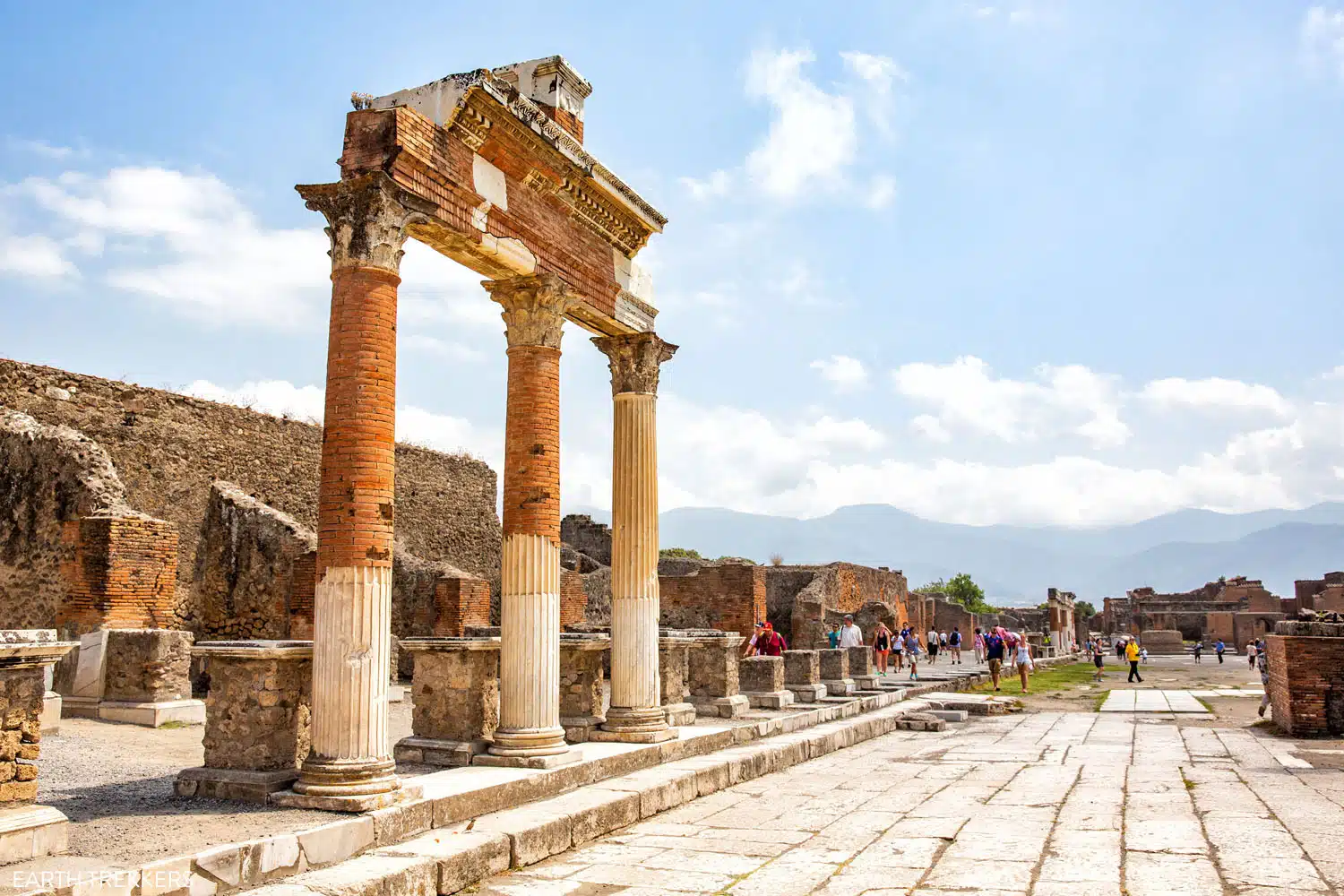
How to Visit Pompeii
Location: Italy
It takes 2 to 4 hours to tour Pompeii. For the best experience, consider taking a guided tour, to get as much out of the visit as possible. If you are active and adventurous, on the same day you can also hike the trails on top of Mount Vesuvius.
For pricing, hours, and to purchase your tickets in advance, visit the official Pompeii website.
12. Lake Bled, Slovenia
Tucked away in the Julian Alps of Slovenia sits one of the loveliest lakes in Europe. Visiting its hilltop castle, hiking to viewpoints of the lake, swimming, taking a boat trip out to the tiny island, and indulging on Bled Cream Cake are the best things to do here.
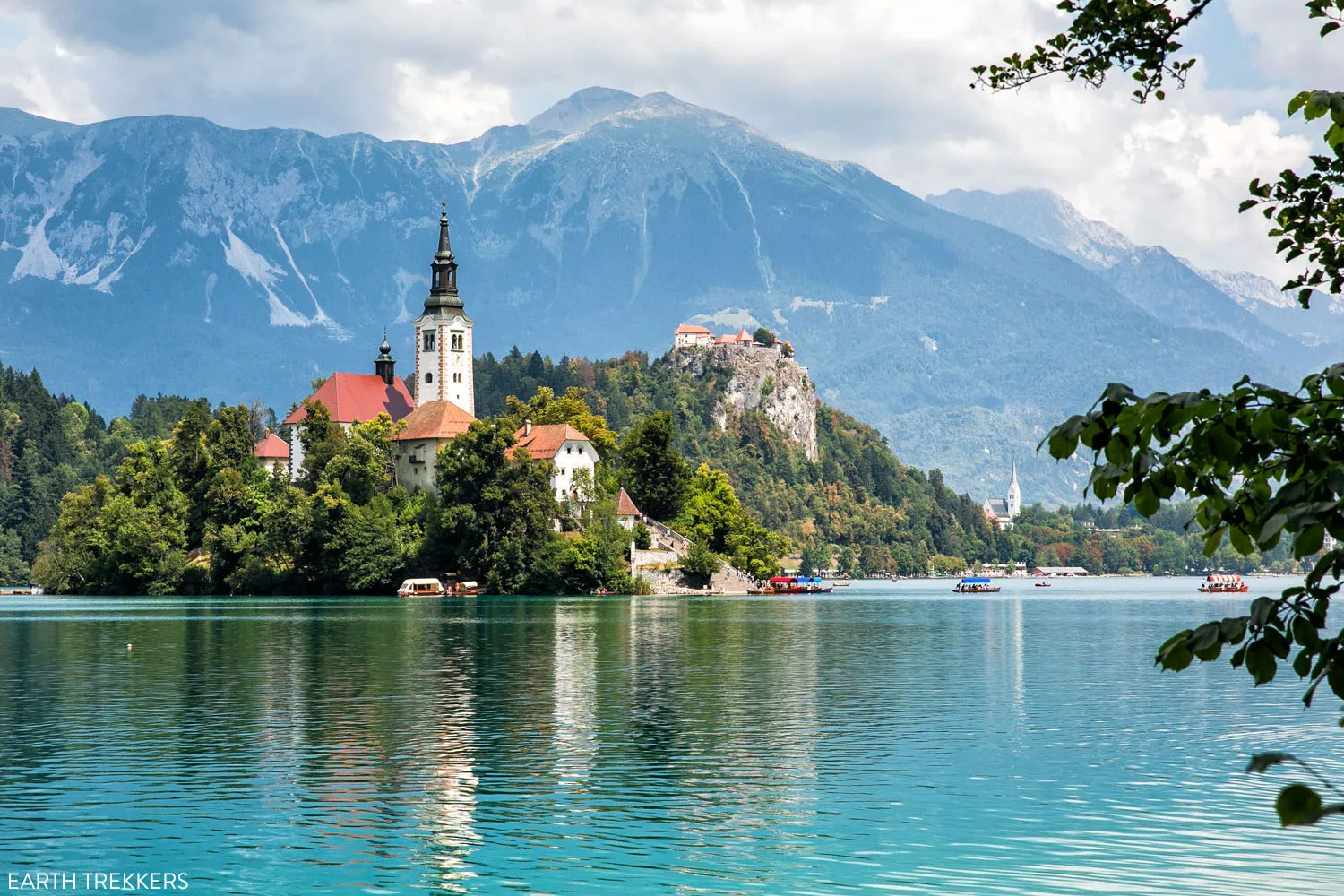
LEARN MORE: 8 Amazing Things to Do in Lake Bled
13. St. Peter’s Basilica & the Vatican Museums
Vatican City is the smallest country in the world. It is located in Rome and contains three important places to visit: the Vatican Museums, the Sistine Chapel, and St. Peter’s Basilica.
The Vatican Museums display the massive collection of art that was amassed by the Catholic Church. There are 70,000 works of art on display in roughly 2,000 rooms of this maze of a museum.
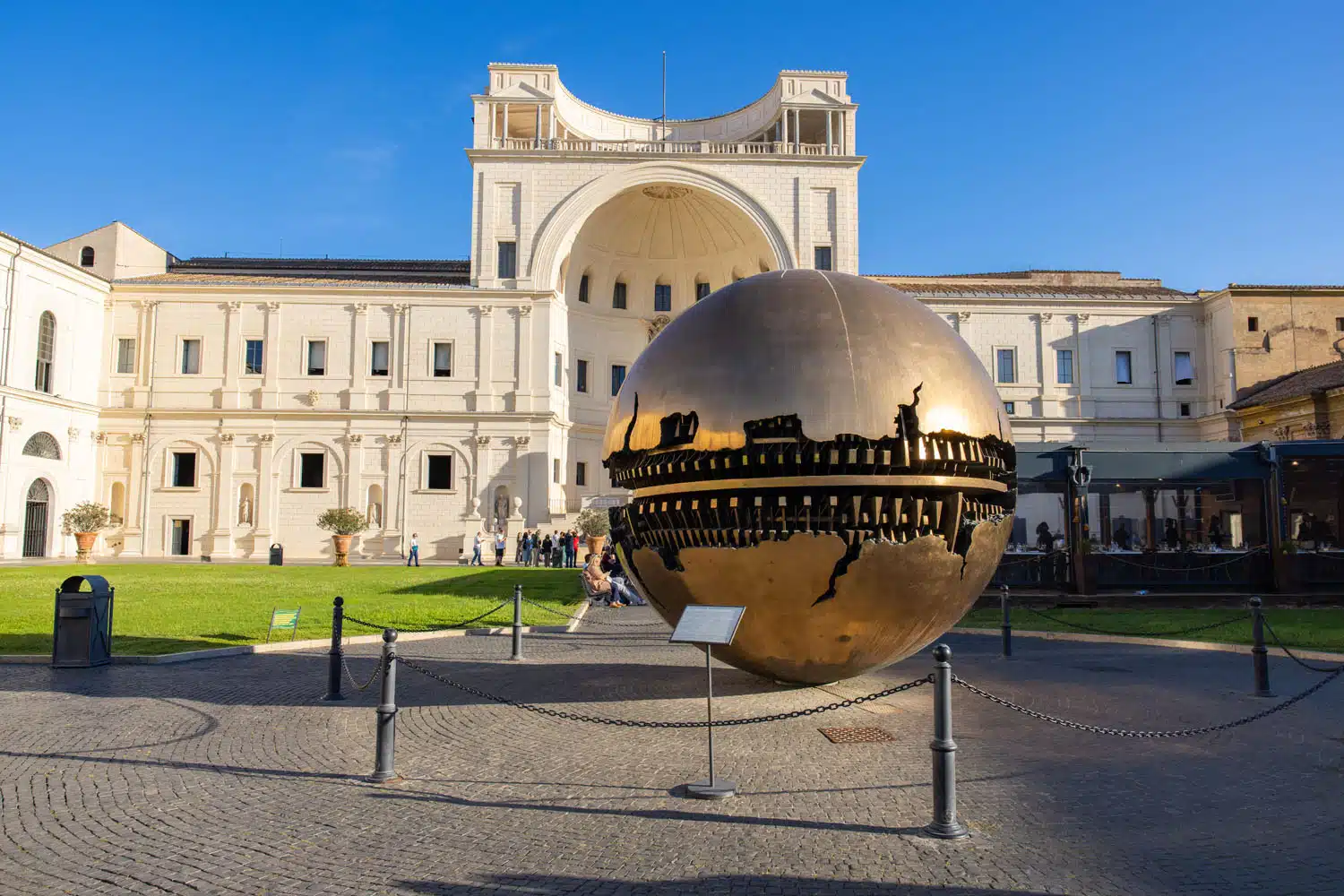
The Pinecone Courtyard at the Vatican Museums | Tourist Attractions in Europe
The Sistine Chapel is located in the Vatican Museums. It is famous for its ceiling, which was painted by Michelangelo in the 16th century.
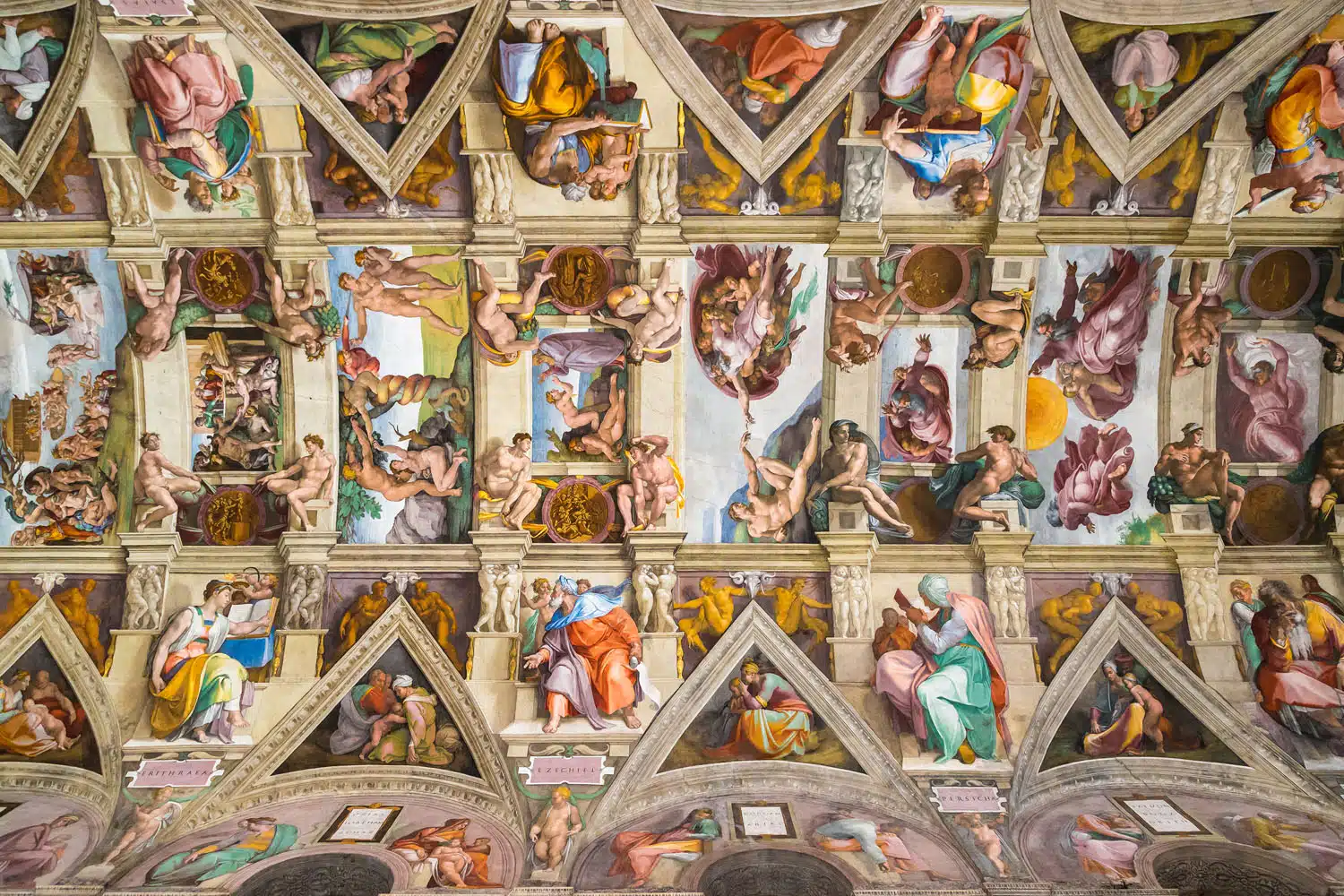
Ceiling of the Sistine Chapel | Sergii Figurnyi/shutterstock.com
St. Peter’s Basilica is the largest church in the world. The inside is awe inspiring. Michelangelo, Gian Lorenzo Bernini, and Donato Bramante all played a part in designing and decorating the basilica. On a visit here, you can climb to the top of the dome for one of the most famous views of Rome and see La Pietà, a statue carved by Michelangelo when he was only 23 years old.
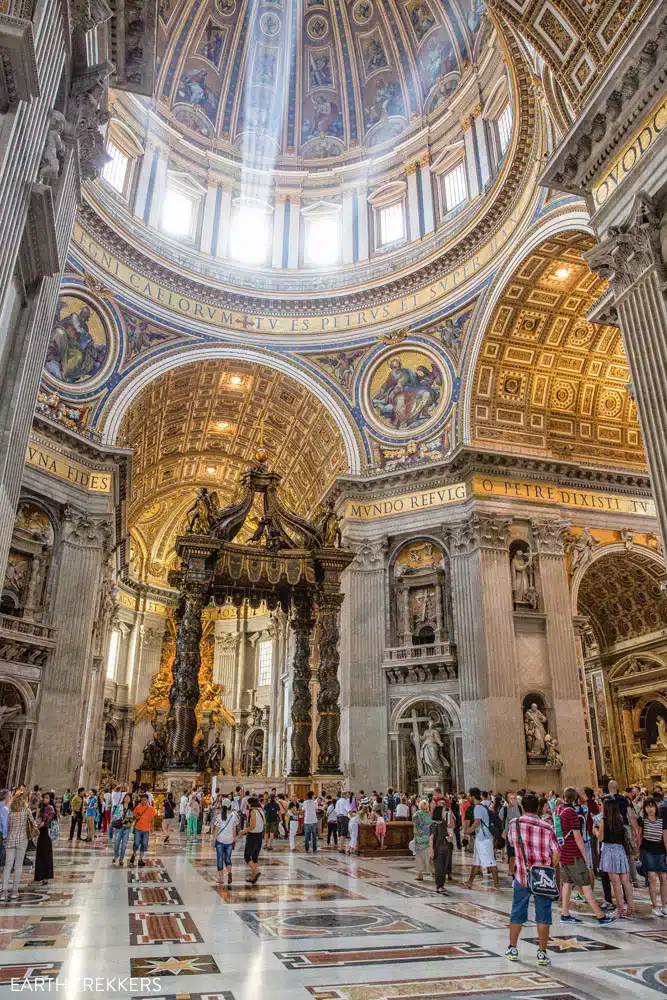
How to Visit the Vatican Museums & St. Peter’s Basilica
In our Guide to the Vatican Museums & St. Peter’s Basilica, we cover everything you need to know to plan your visit, including ticket options, hidden rooms in the Vatican, and whether or not it is worth it to take a tour.
14. The Matterhorn
The Matterhorn is an iconic mountain that straddles the border of Switzerland and Italy. Its pyramidal shape makes it one of the most recognizable mountains in the world.
The best way to see the Matterhorn and get the classic view of it is to plan a trip to Zermatt, Switzerland. Once in Zermatt, trains and cable cars whisk visitors high into the mountains for a view of the Matterhorn. Those who are very fit and adventurous can summit the Matterhorn.
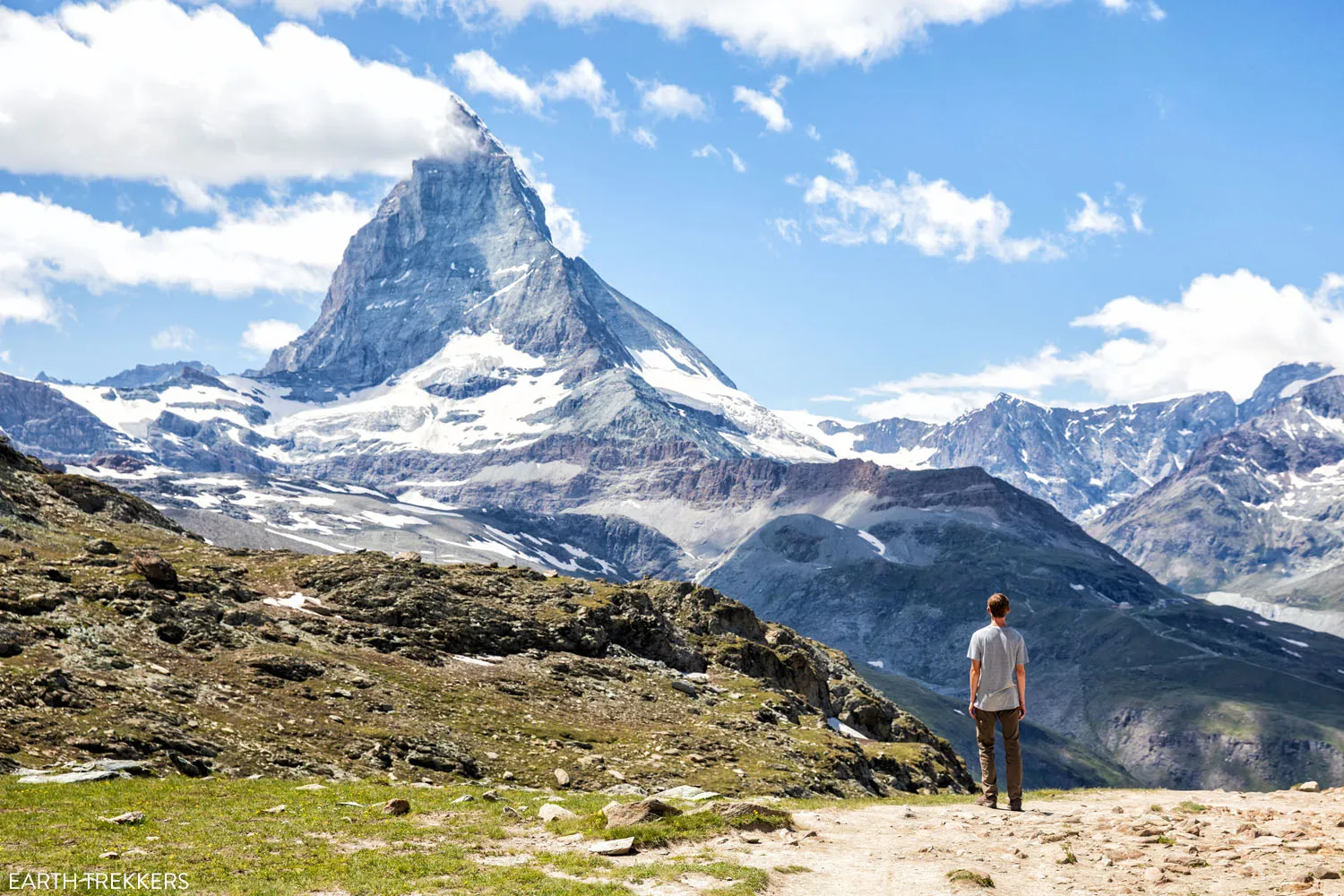
The view on the hiking trail between Gornergrat and Riffelberg
How to Plan a Trip to Zermatt
Plan on spending at least 2 days in Zermatt. This gives you enough time to ride a few cable cars and gives you a better chance to see the Matterhorn without it hiding behind the clouds. Our favorite views of the Matterhorn are from Gornergrat and Hörnlihütte.
Plan your visit with our Zermatt Itinerary and Things to Do in Zermatt articles.
15. The Alhambra
This UNESCO World Heritage Site is known as being one of the best-preserved palaces of the historic Islamic world.
The first buildings date back to the 9th century. The complex of palaces that we see today were started in 1238 by the first Nasrid ruler, Muhammad I Ibn al-Ahmar. It took several hundred years for them to be completed.
In 1492, after the Reconquista, the Alhambra became the Royal Court of Ferdinand and Isabella. This is where Christopher Columbus received his endorsement to voyage across the Atlantic Ocean.
Now the Alhambra is one of Spain’s (and Europe’s) most visited attractions.
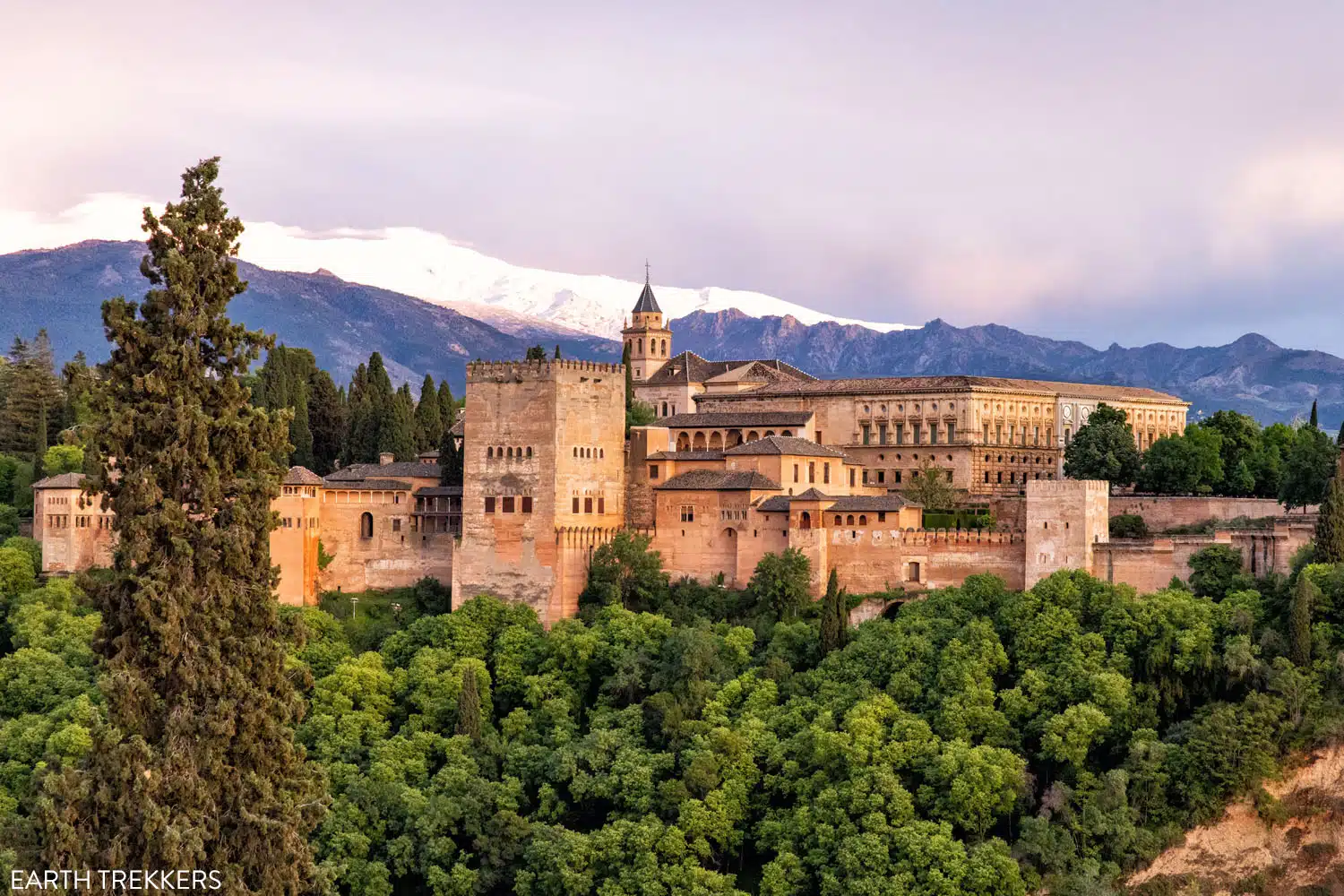

Court of the Lions
How to Plan a Visit to the Alhambra
Location: Granada, Spain
Tickets: Tickets must be purchased online in advance. These frequently sell out in advance, making a guided tour your next best option.
Things to See at the Alhambra: It takes about half of a day to visit the Alhambra. The Nasrid Palaces are the most famous attraction, but you can also visit the Alcazaba (the fortress) and Generalife (the summer palace).
Learn More: How to Visit the Alhambra
16. The Hofburg Palace
The Hofburg Palace is massive complex of buildings in Vienna, Austria. It has been the seat of the Austrian government since the 13th century and the winter residence of the Habsburgs.
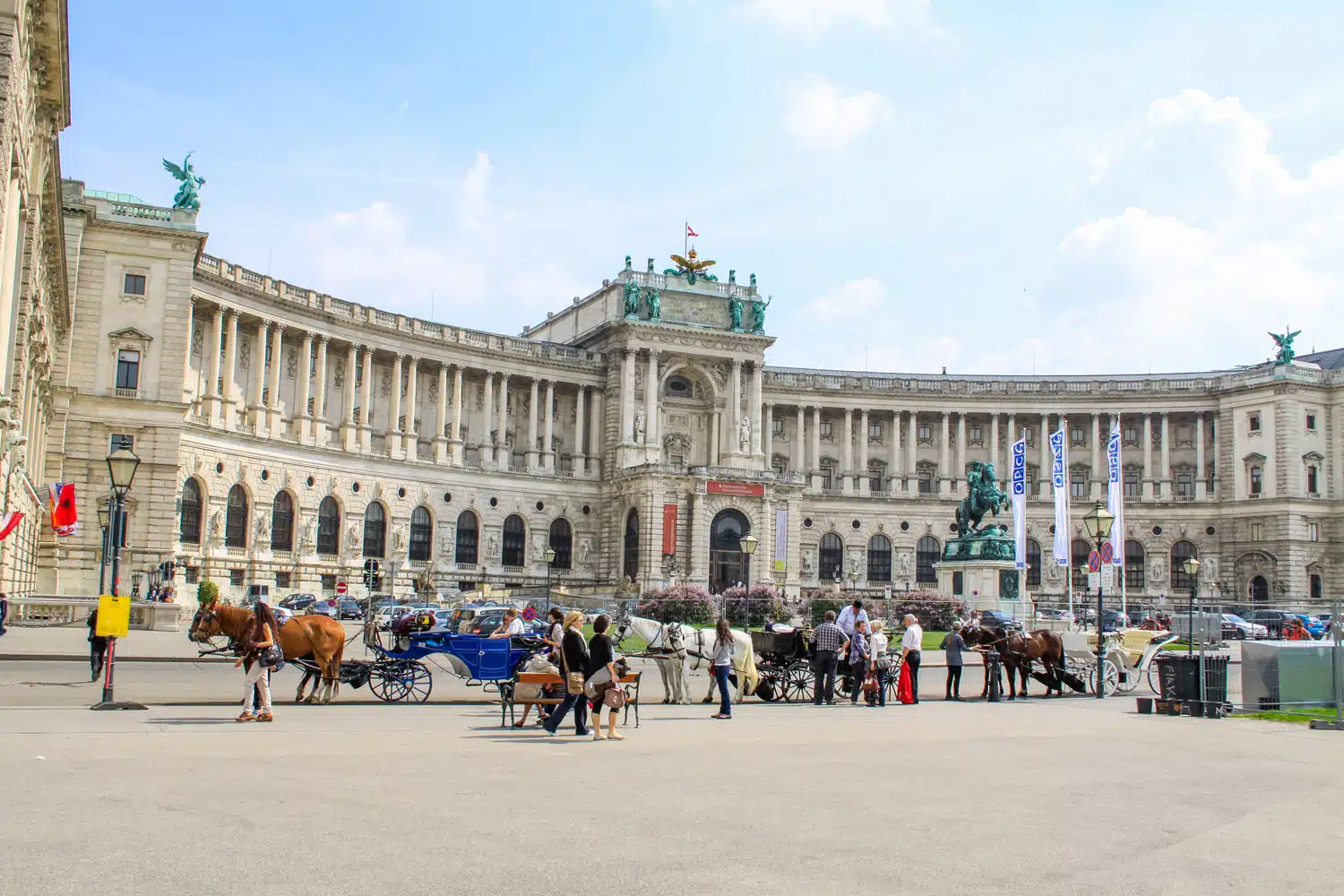
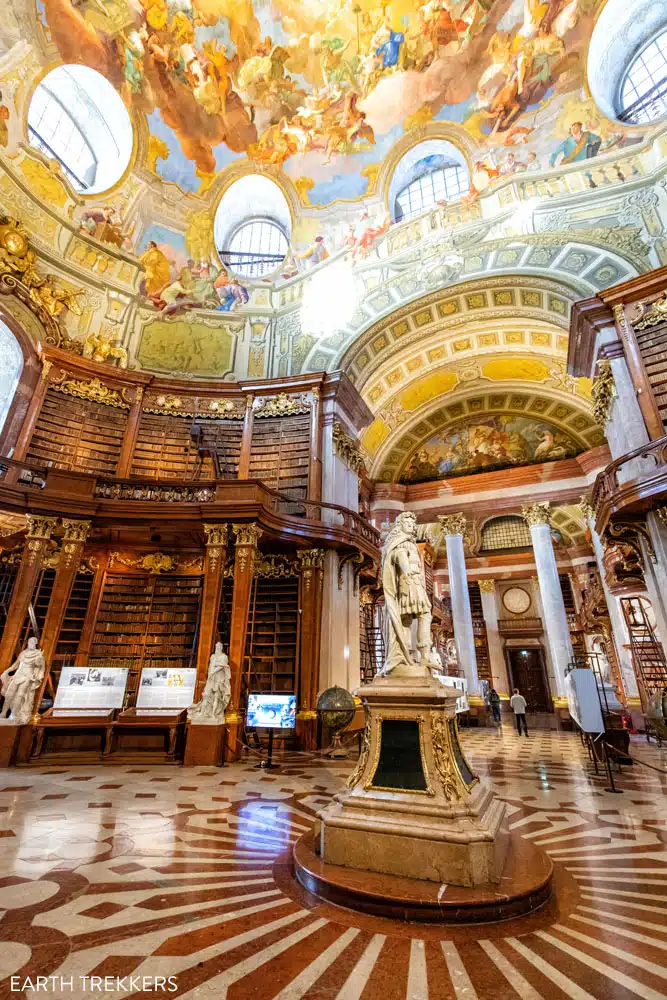
Austrian National Library
How to Visit the Hofburg Palace
Location: Vienna, Austria
Top Experiences: See the Lipizzaner stallions at the Spanish Riding School, tour the Sisi Museum and Imperial Apartments, visit the House of Habsburgs Tour, see the Imperial Treasury, attend a performance by the Vienna Boys’ Choir, and visit the Austrian National Library.
Learn More: 25 Amazing Things to Do in Vienna
17. The Cliffs of Moher
The Cliffs of Moher are one of the most dramatic coastlines in Europe. Over one million people visit the Cliffs of Moher every year, making this one of Ireland’s most popular attractions.
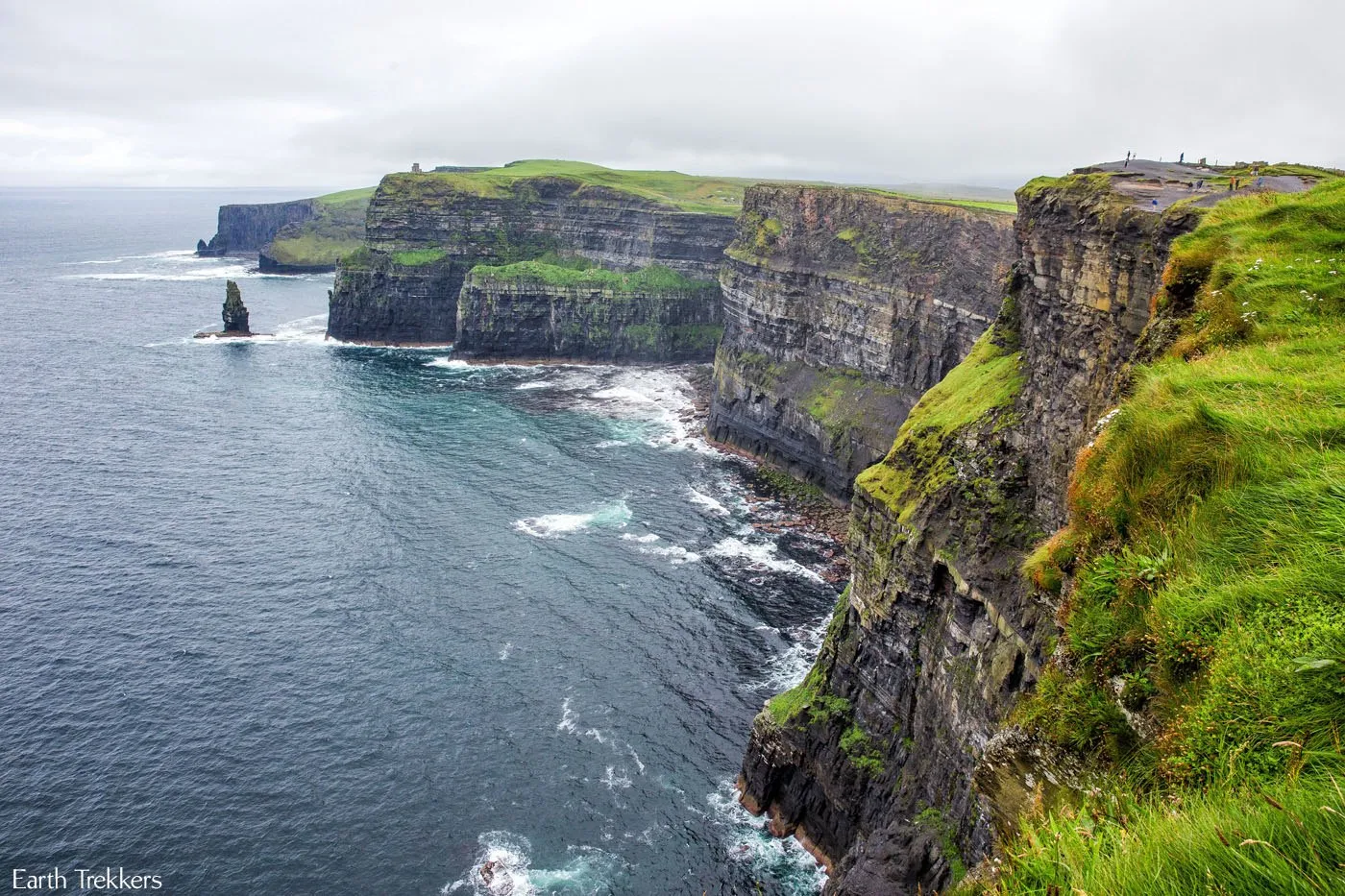
How to Visit the Cliffs of Moher
Location: Ireland
These cliffs stretch 14 km north to south, starting in Doolin in the north and ending at Hags Head in the south. For the quickest view of the cliffs, drive to the visitors center and it is a short walk to the viewpoints. Those who want to experience the entire stretch of coastline can hike the cliff top trails.
Learn More: How to Visit the Cliffs of Moher
18. The Hagia Sophia
Located in Istanbul, Turkey and constructed between 532 and 537 by Byzantine Emperor Justinian I, the Hagia Sophia started out as a church. It was the first building to have a pendentive dome and it was the largest building in the world until the Seville Cathedral was completed in 1520.
In 1453, after the fall of Constantinople to the Ottoman Empire, the Hagia Sophia was converted to a mosque. The Christian iconography was removed and minarets, a minbar, and a mihrab were added. The Hagia Sophia became a museum in 1935 and in 2020 once again became classified as a mosque.
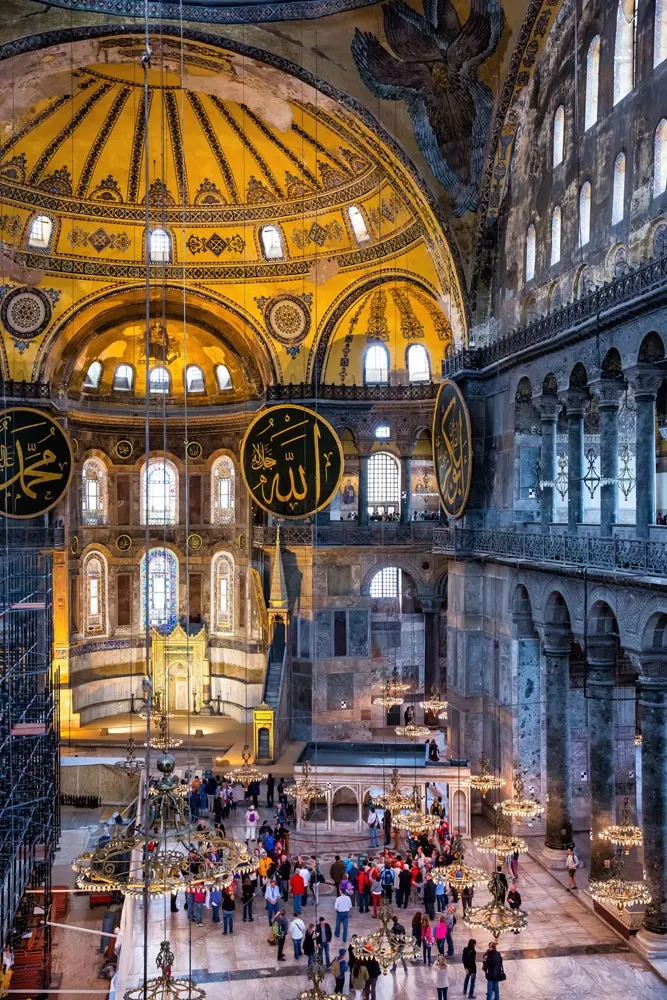
Learn more in our article Best Things to Do in Istanbul.
19. The Canals of Venice
Venice, with its maze of canals, historic buildings and bridges, and coastal setting make it one of the most romantic cities in Europe. Going for a stroll along the canals and taking a gondola ride draws millions of visitors to Venice each year.
The most famous of Venice’s canals is the Grand Canal. This major waterway is spanned by the Rialto Bridge and Ponte dell’Accademia, two great places to capture an iconic photo of Venice. Leading off of the Grand Canal is a network of smaller canals, each with their own charm.
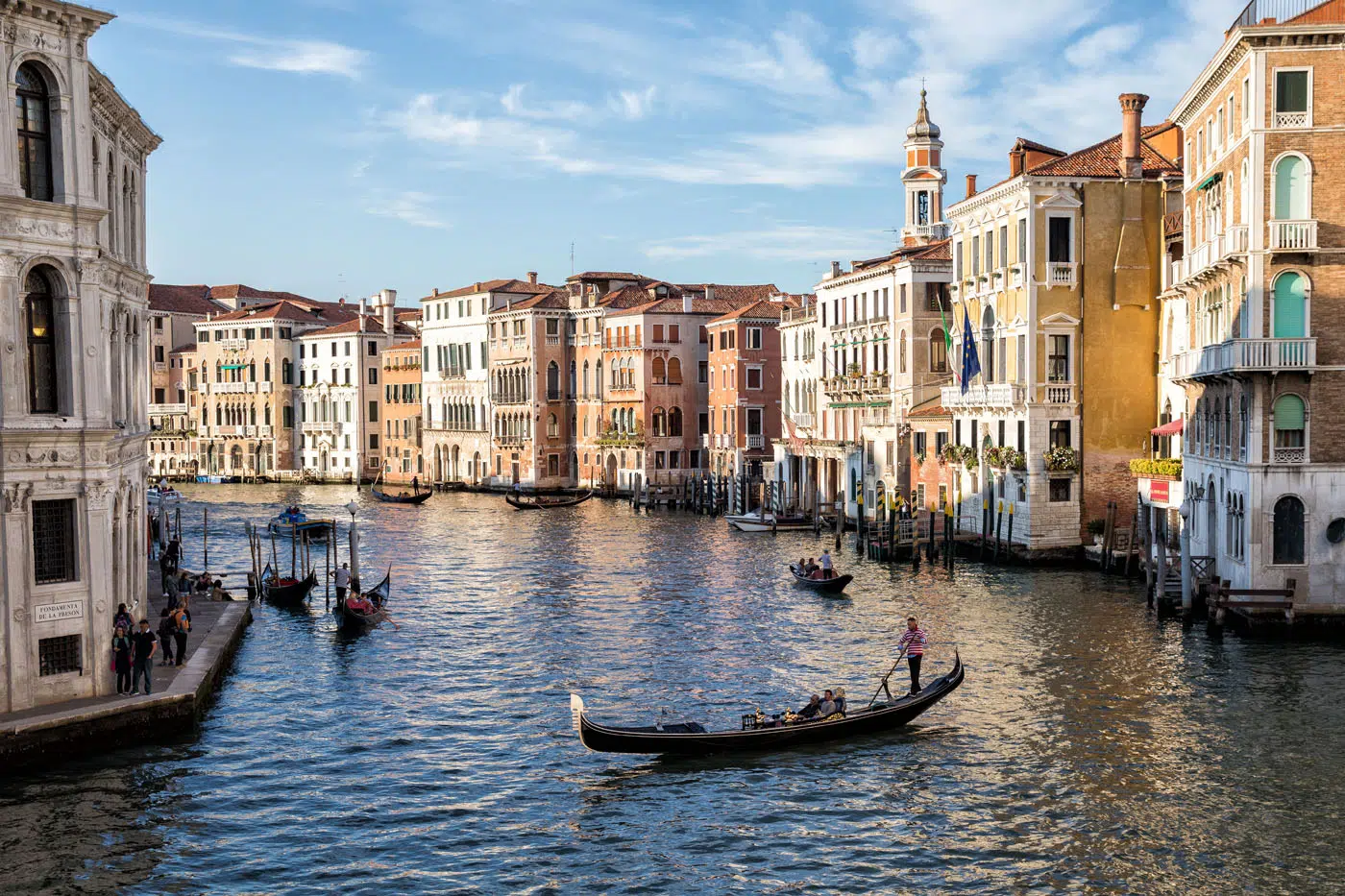
How to Visit Venice
If you move fast, a day is all you need in Venice, to see its main sights and take a gondola ride on the canals. However, 2 to 3 days allows you to slow down and savor the sights. Be aware that there is now a tourist tax to visit Venice.
Plan your visit with our One Day Venice Itinerary and 2 Day Venice Itinerary.
20. The Palaces & Castles of Sintra
Sintra, Portugal is a land of fairytale palaces, historic estates, and stunning coastlines.
Pena Palace is Sintra’s most famous sight, but the Initiation Well and gardens at Quinta da Regaleira are also very popular. The Castle of the Moors is an ancient castle located high in the hills. Walking the walls here is one of our favorite experiences in Sintra. Venturing out to Monserrate Palace is also well worth it, with its gorgeous palace and gardens.
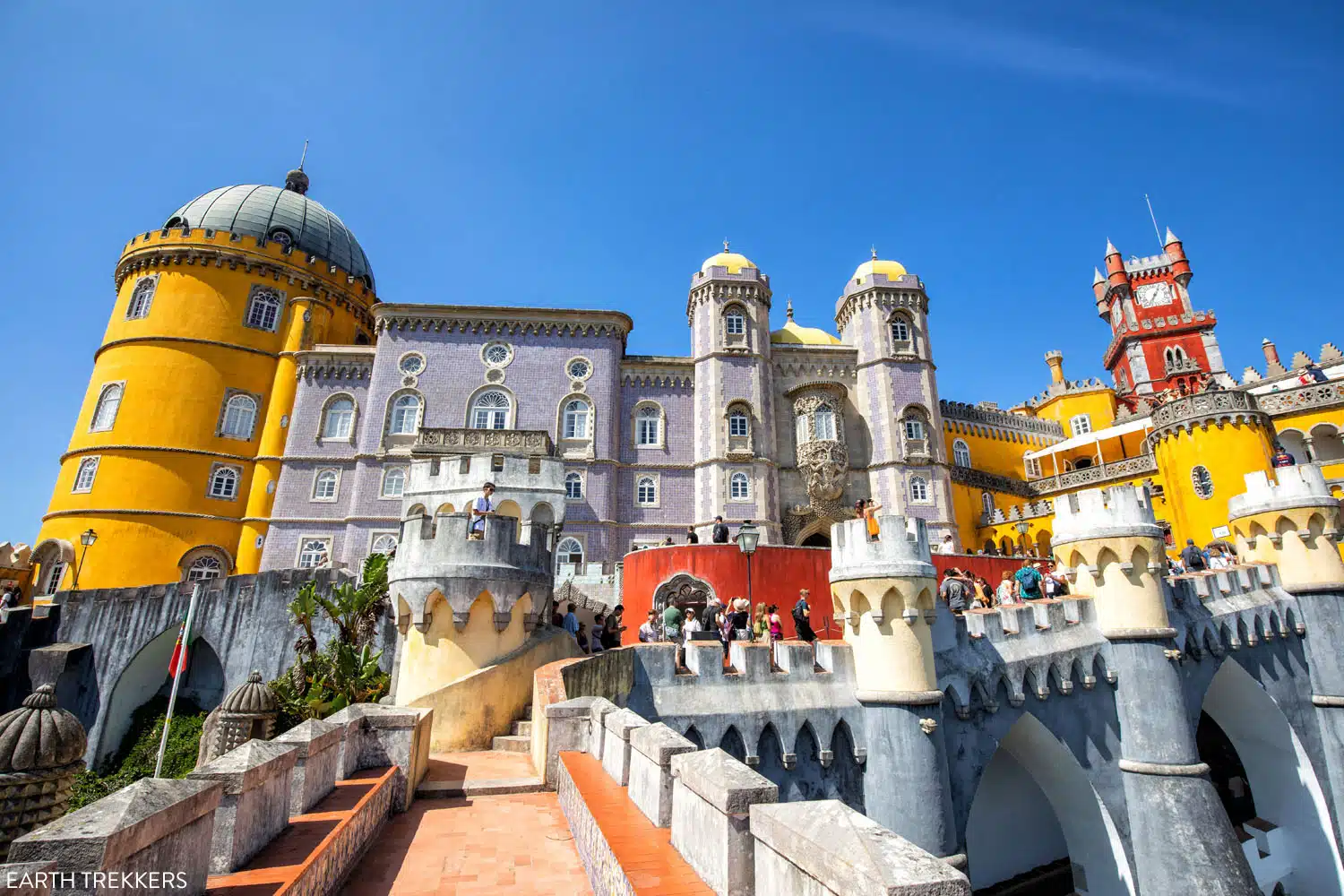
Pena Palace | Tourist Attractions in Europe
How to Visit Sintra
Location: Portugal
Sintra is the #1 day trip from Lisbon. Plan your visit with our guides How to Spend One Day in Sintra and Best Things to Do in Sintra.
21. The Walls of Dubrovnik
Dubrovnik, Croatia is an absolute joy to visit. Its small, compact city center (yet another UNESCO World Heritage Site) is surrounded by ancient walls that date back to the Middle Ages. Walking these walls are one of the most memorable experiences in Dubrovnik.
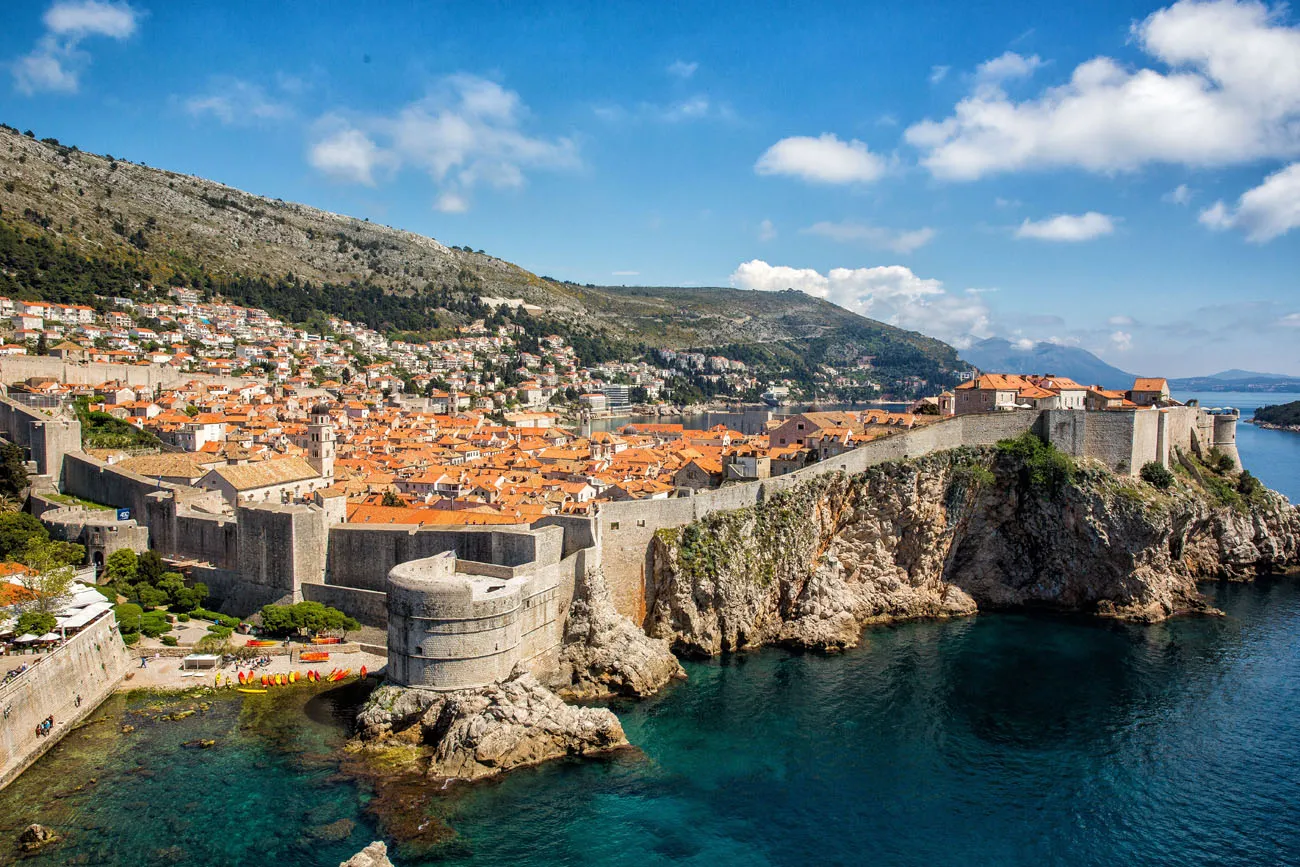
LEARN MORE: How to Walk the Dubrovnik Walls
22. The Hungarian Parliament Building
This grand building, also called the Parliament of Budapest, sits on the bank of the Danube River. Construction started in 1885 and was completed in 1906, and Imre Steindl, the architect, designed the building taking inspiration from the Palace of Westminster in London.
Visiting the Hungarian Parliament is one of the top attractions in Budapest. Getting the iconic view of the bridge from the Buda side of Budapest is another one of the city’s top experiences for visitors.
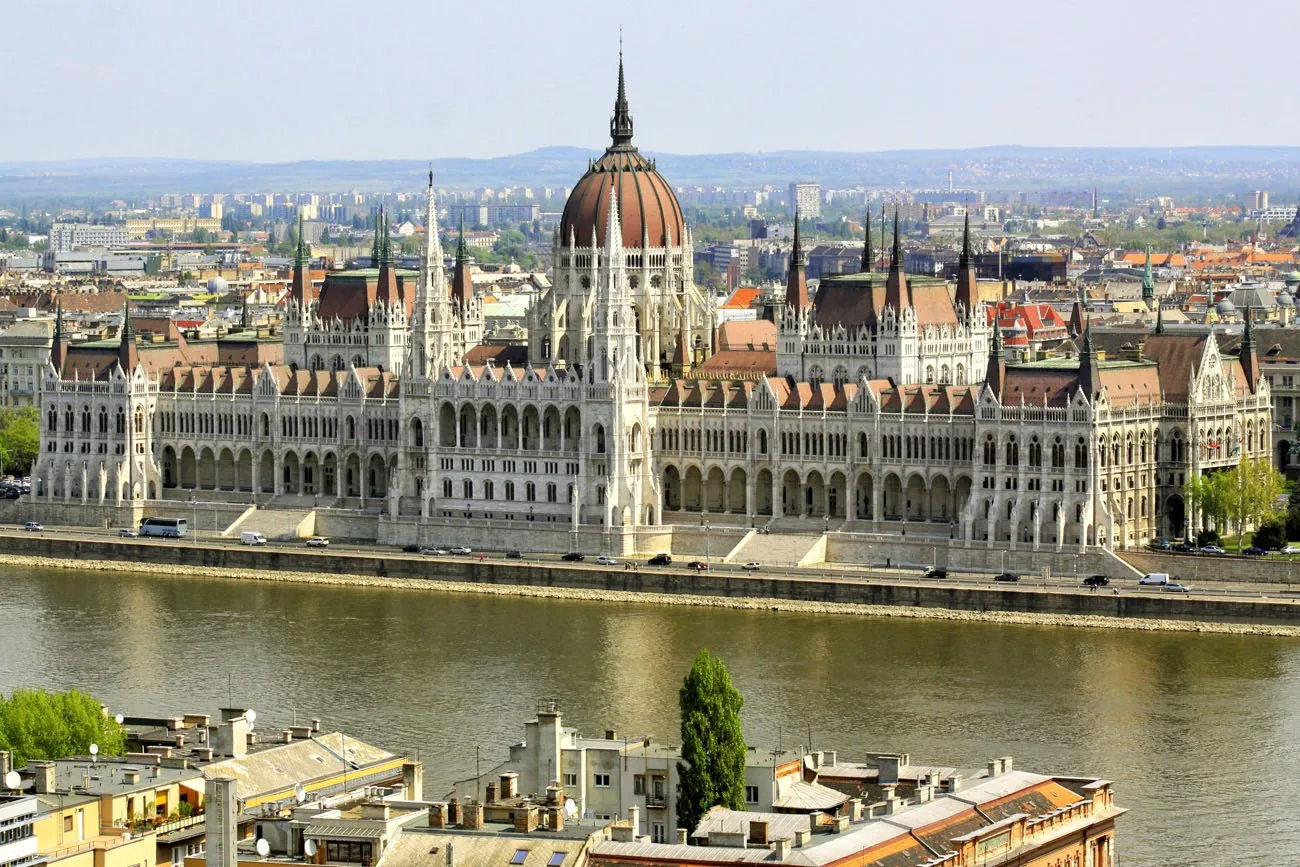
Plan Your Visit to Budapest: How to Spend 2 Days in Budapest
23. The Isle of Skye
Located in the Highlands of Scotland, the Isle of Skye is renowned for its mystical landscapes, scenic drives, waterfalls and rock formations, quaint towns, and hiking trails.
Top experiences include seeing the Old Man of Storr, touring Dunvegan Castle, photographing Neist Point, tasting whisky at Talisker Distillery, hiking the Quiraing, and visiting the Fairy Pools and the Fairy Glen.
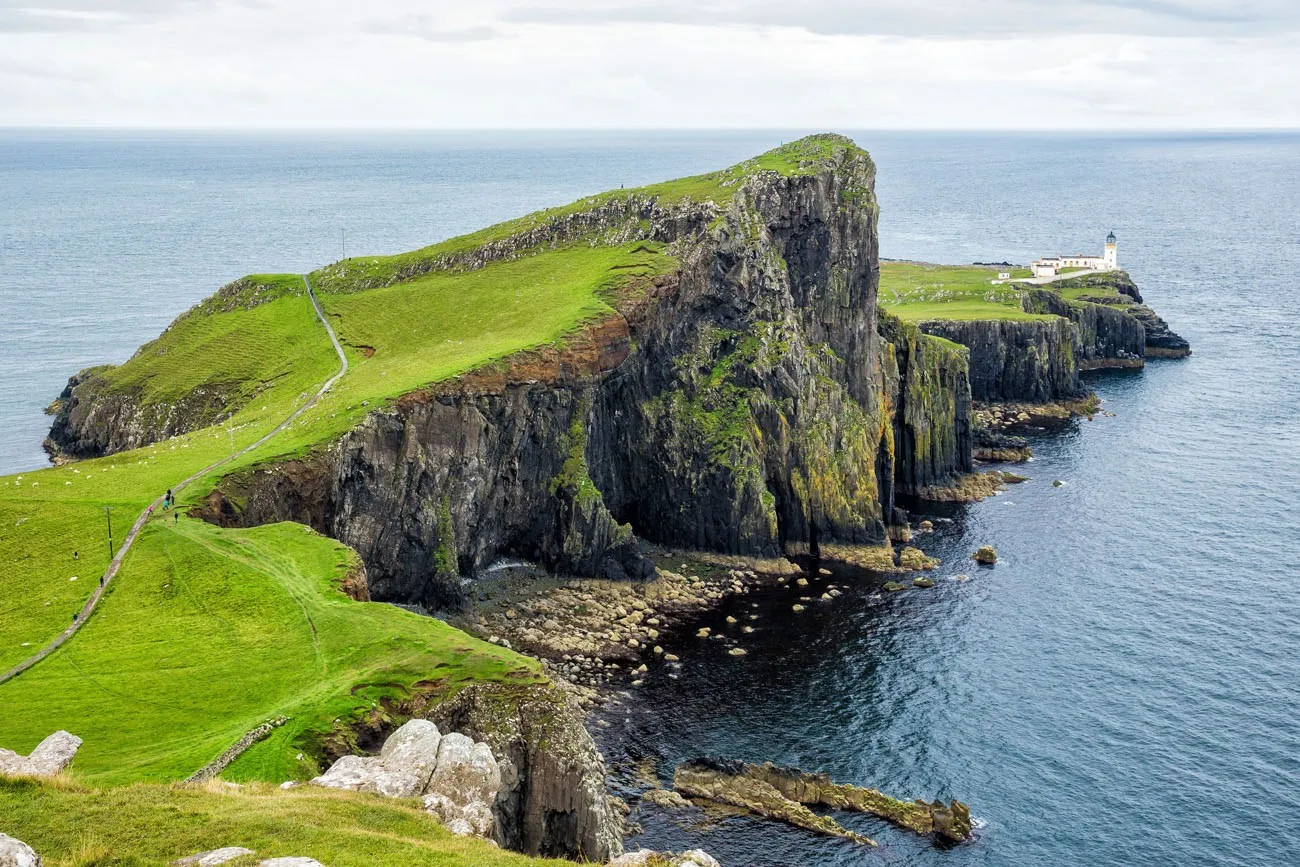
Neist Point | Tourist attractions in Europe
How to Visit the Isle of Skye
For the best experience, plan on spending a minimum of 2 days and 2 nights on the Isle of Skye, to drive the Trotternish Loop, visit Dunvegan Castle, and hike a few short trails. Plan your trip with our Isle of Skye Travel Guide and Isle of Skye Itinerary.
24. The Palace of Versailles
For over 100 years, French kings lived and ruled from the opulent Palace of Versailles. The Peace of Paris was signed here in 1783 and the Treaty of Versailles, which formally ended World War I, was signed in the Hall of Mirrors in 1919.
Now, the Palace of Versailles is one of the most popular tourist attractions in the world. Like many other popular tourist attractions in Europe, it is also a UNESCO World Heritage Site.
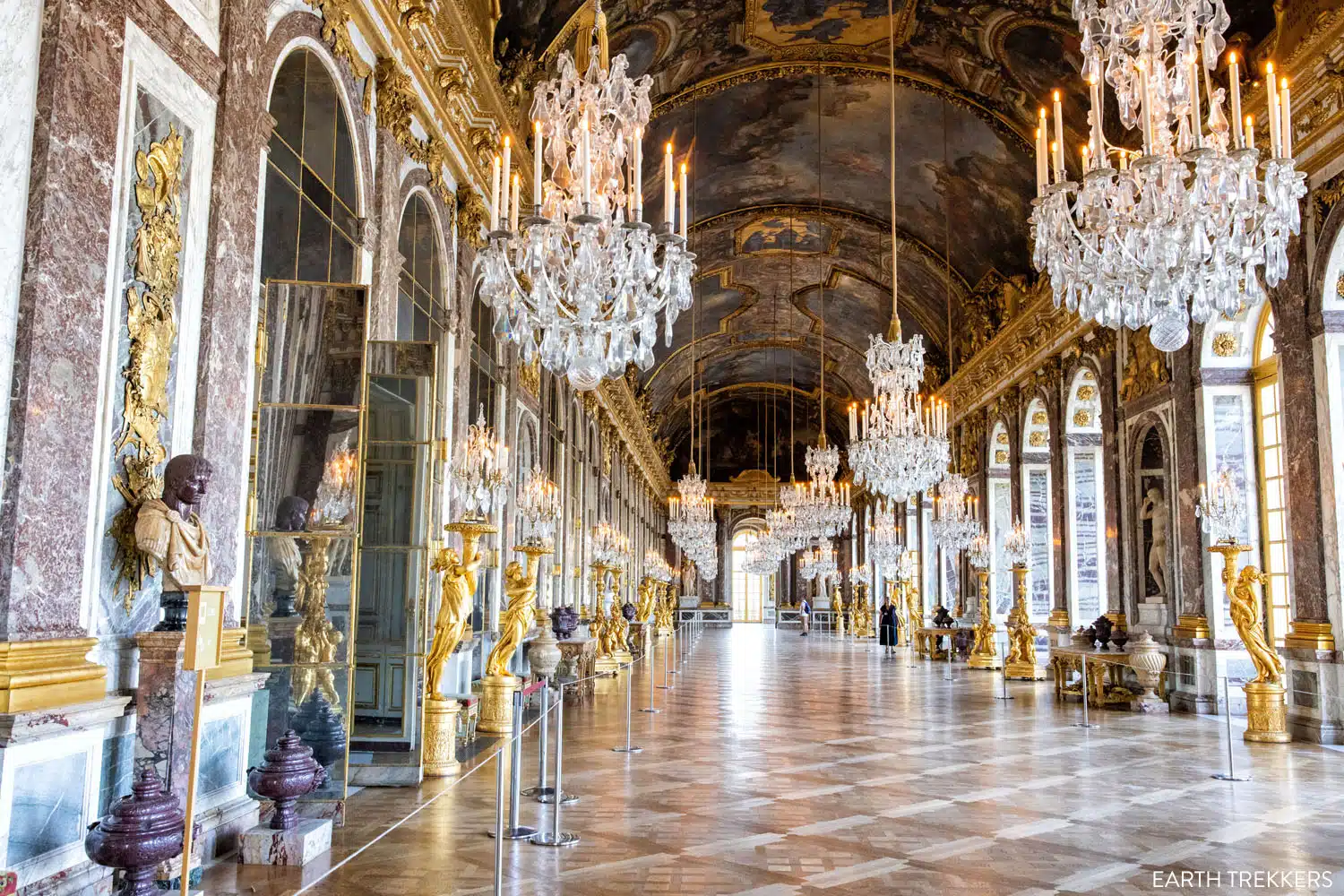
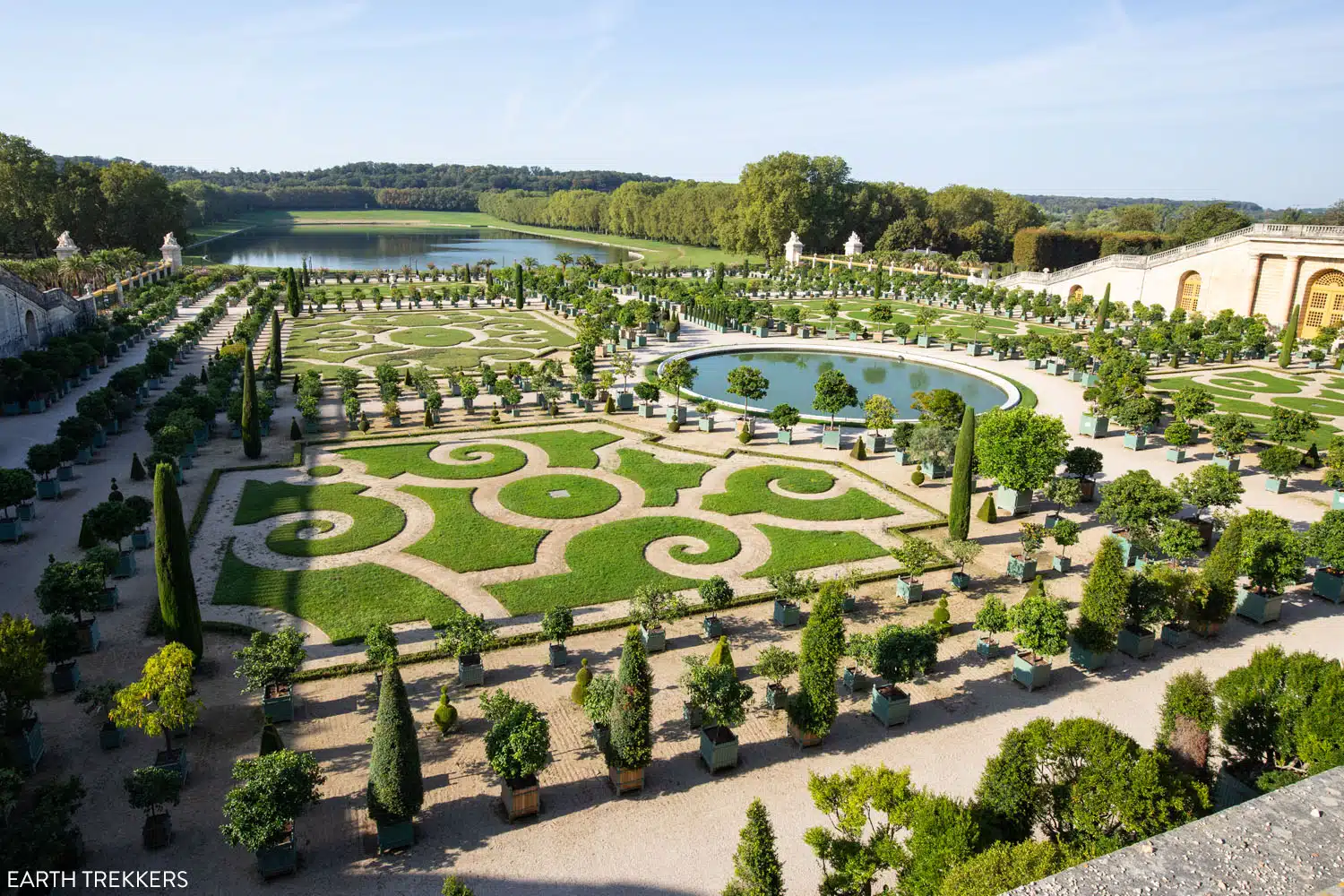
How to Visit the Palace of Versailles
Location: Versailles, France
The Palace of Versailles is one of the most popular day trips from Paris. A visit here lasts a half day, but there is enough to do that you could really spend a full day here. It is best to purchase tickets in advance and this is another attraction where taking a guided tour can help you get the most out of your visit.
In our Guide to Visiting Versailles, we cover how to get here, ticket types, the top things to do, a sample itinerary, and lots of tips to help you have the best experience.
25. The Brandenburg Gate
The Brandenburg Gate is one of the most famous landmarks in Germany.
The structure we see today was built between 1788 and 1791 and its name meant ‘Peace Gate.’ In 1806, not long after its construction, Napoleon took the bronze sculpture of a horse and chariot when he invaded Berlin. This statue was later returned.
For almost 30 years, from World War II until 1989, the Brandenburg Gate was blocked by the Berlin Wall, and it became a symbol of the city’s division.
After the fall of the Berlin Wall in 1989, the Brandenburg Gate became a symbol of unity and peace, its original intention when it was constructed 200 years earlier.
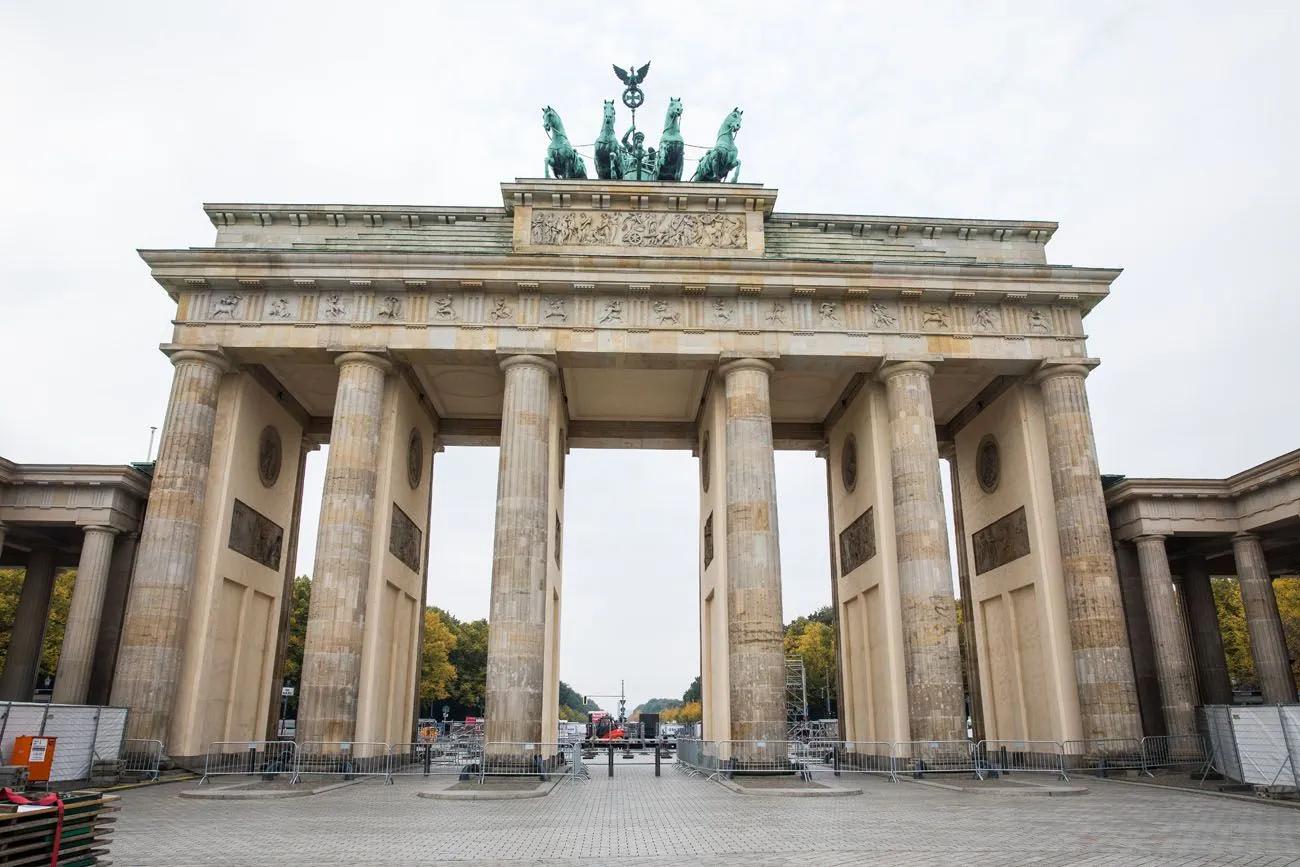
How to Visit the Brandenburg Gate
The Brandenburg Gate is located in Berlin, Germany. It sits on Pariser Platz, a large pedestrian only square. It is free to visit.
26. The Prado National Museum
Adorning the walls of the Prado National Museum are works of art by Titian, El Greco, Peter Paul Rubens, Diego Velázquez, and Bosch, with Francisco Goya being the most represented artist in the museum. This museum contains the largest collection of Spanish art in the world and it is the #1 visited attraction in Madrid, Spain.
The Prado Museum, Museo Reina Sofia, and the Thyssen-Bornemisza Museum form a trio of art museums which is called Madrid’s Golden Triangle of Art.
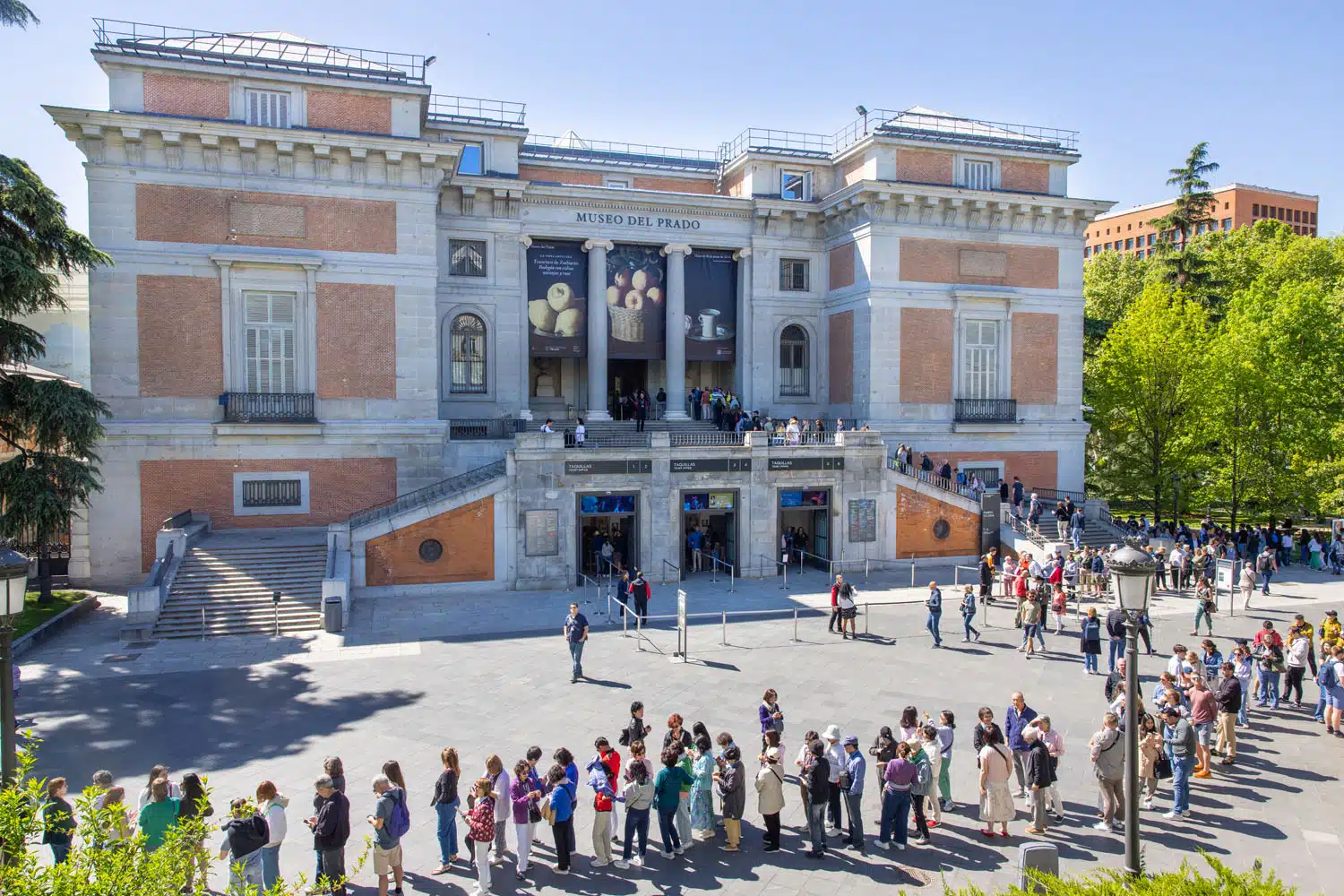
How to Visit the Prado National Museum
Location: Madrid, Spain
Tickets & Timing: It takes 1 to 3 hours to visit the Prado Museum, depending on your interests. Purchase your entry ticket at least a few weeks in advance of your visit because the ticket lines can be enormous.
27. The Florence Cathedral
The Florence Duomo (also called the Duomo di Firenze and Cattedrale di Santa Maria del Fiore) is one of the most recognizable cathedrals in the world. It is considered to be one of the most important projects during the Renaissance.
The Duomo is most famous for its dome, which was designed by Brunelleschi, constructed between 1420 and 1436, and then painted with scenes from the Last Judgement.
A visit to this cathedral is more than just walking through the cathedral and seeing the dome. You can also climb Giotto’s bell tower, walk the stairs to the top of Brunelleschi’s dome, and visit the Baptistery.
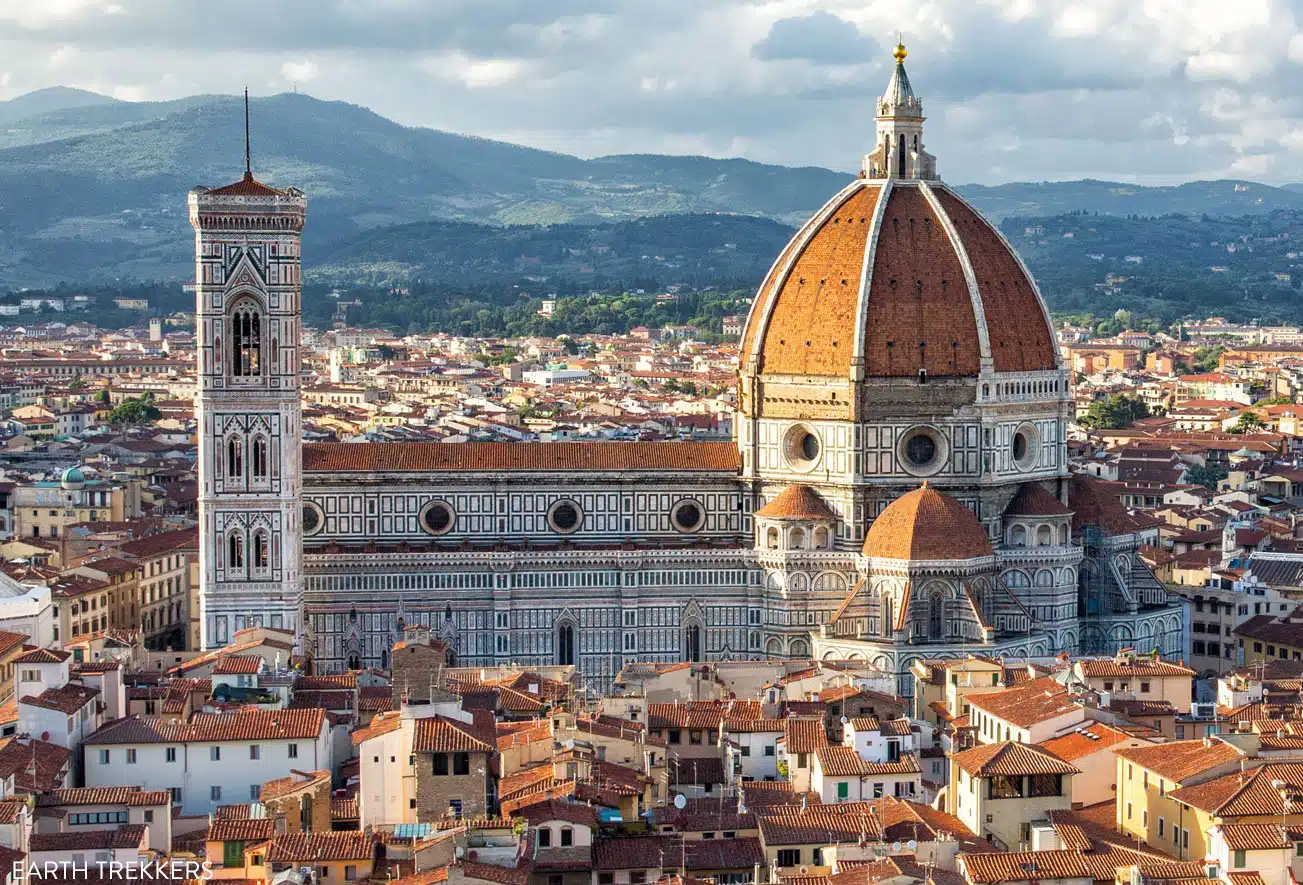
How to Visit the Florence Cathedral
Location: Florence, Italy
In our Guide to the Florence Cathedral, we cover the various ticket types, the best things to see and do, and how to plan your time.
28. Stonehenge
This semicircular ring of standing stones is one of the most famous landmarks in the United Kingdom. Archaeologists estimate that these stones were placed sometime between 2400 and 2200 BC.
There is still debate about why Stonehenge was built, with theories being it was a burial site, a calendar, or a meeting place.
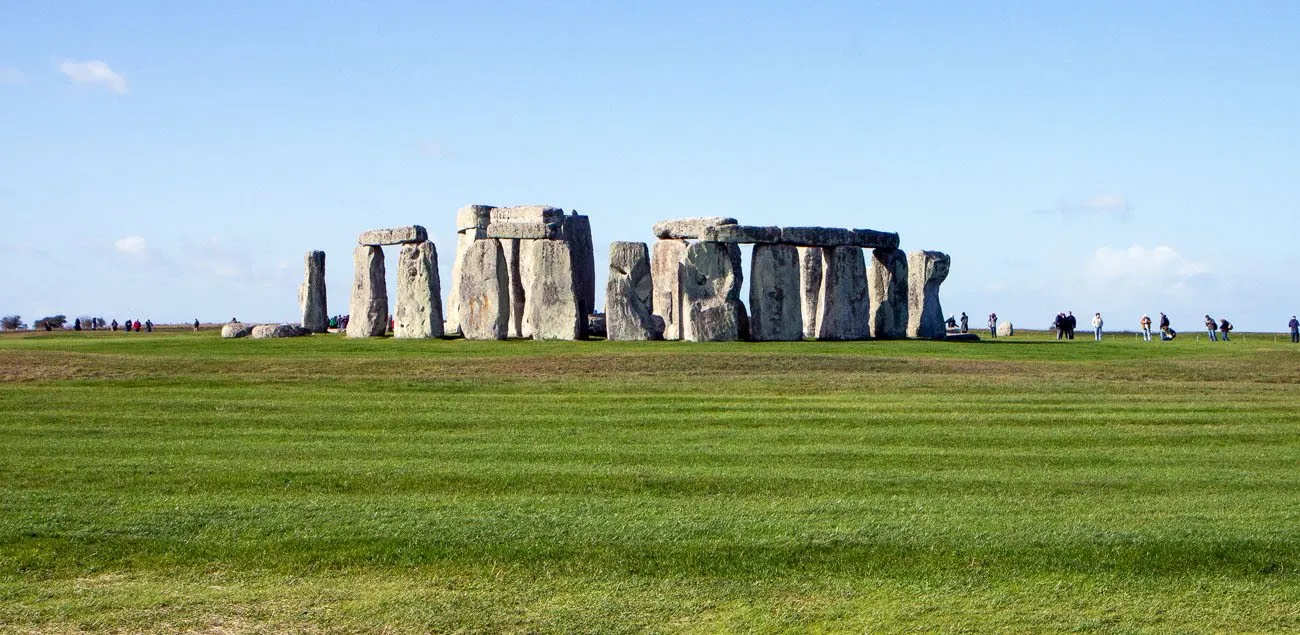
How to Visit Stonehenge
Stonehenge is located near Amesbury, England. It is a popular day trip from London, often combined with Bath and/or Windsor Castle (another famous tourist attraction in Europe).
29. Krakow Old Town
With its colorful streets, enormous market square, and historic sites, the old town of Krakow is a joy to visit.
The Main Market Square is the largest medieval market square in Europe. It is filled with outdoor cafes, tourists, vendors, horse and carriages, and a crazy number of pigeons. Sitting on the square is the Cloth Hall, St. Mary’s Basilica, the Town Hall Tower, and the Rynek Underground Museum.
Branching out from the Main Market Square is a network of picturesque streets that lead to more of Krakow’s must-see places, including Wawel Castle, the Barbican, and Kazimierz.
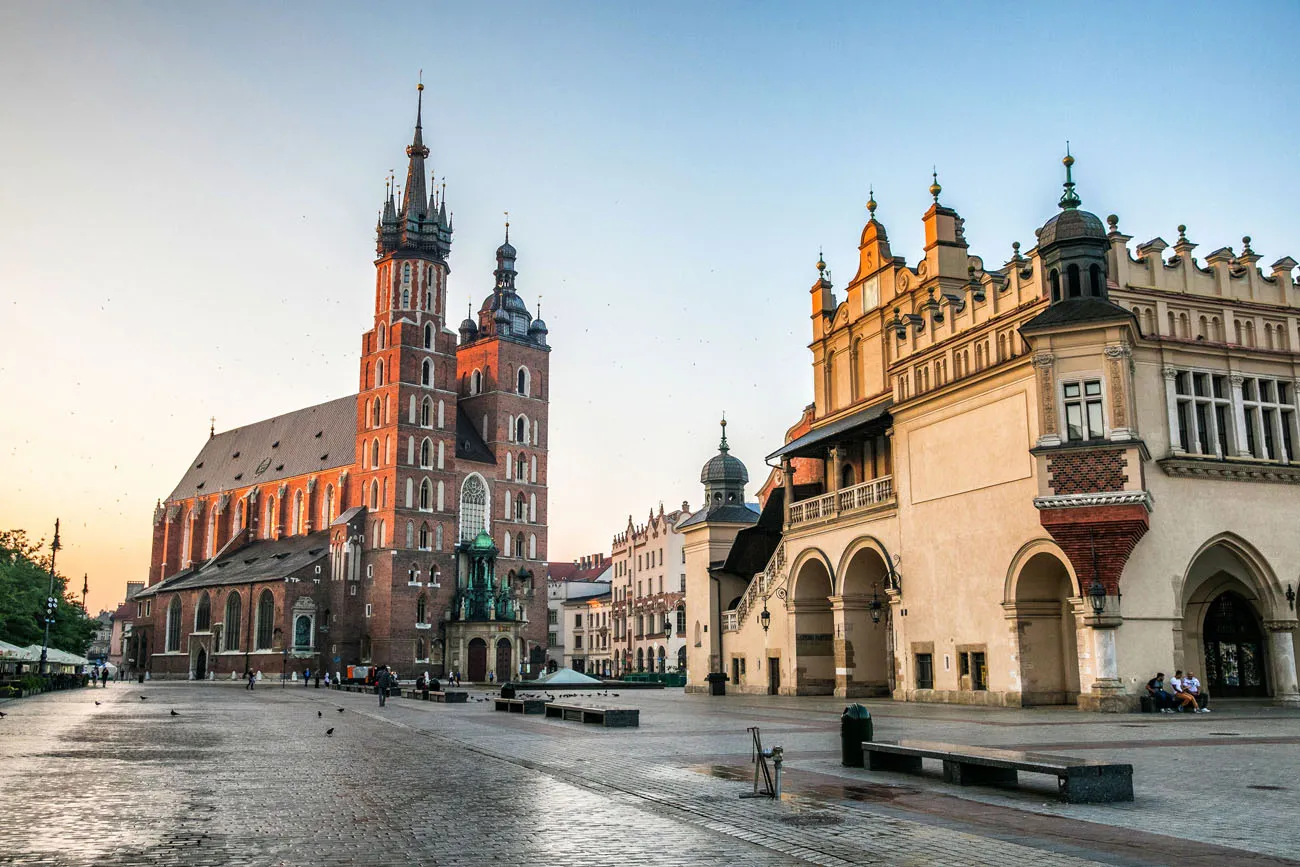
How to Visit Krakow & the Old Town
It takes one to two busy days to visit the old town of Krakow. Plan your visit with our articles Best Things to Do in Krakow and our Krakow Itinerary.
30. The South Coast of Iceland
The south coast of Iceland is home to several of Europe’s most recognizable waterfalls and natural attractions. For first time visitors to Iceland, this small area is a must see.
The mighty Skogafoss waterfall is one of the most iconic sites, but you can also walk behind Seljalandsfoss waterfall, go kayaking in Jökulsárlón Glacier Lagoon, hike on a glacier, see the amazing Fjaðrárgljúfur canyon, and get a view of Eyjafjallajökull, a volcano that erupted in 2010.
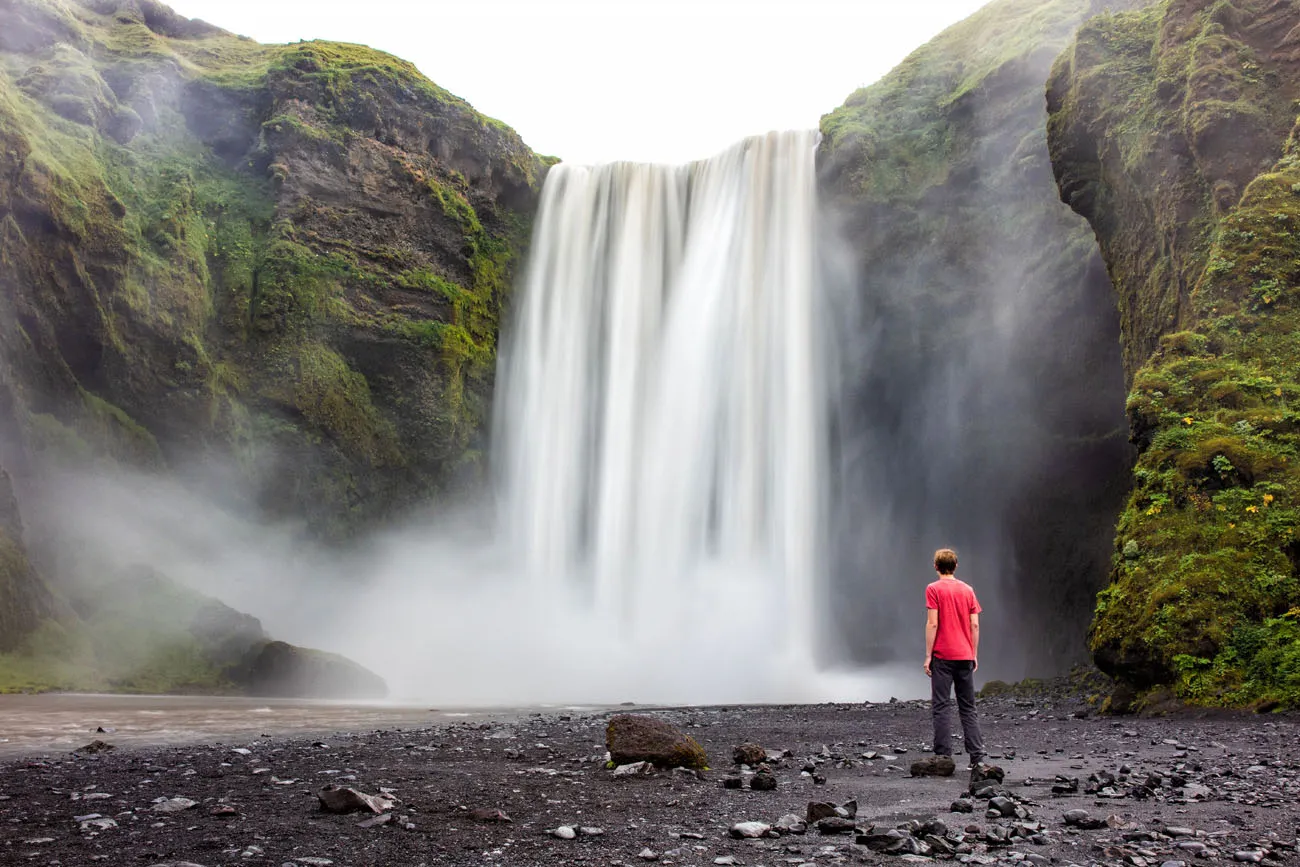
How to Visit the South Coast of Iceland
It takes a minimum of three days to fully see and do everything on the south coast of Iceland, but those with less time can narrow down the list to a few key sights and concentrate on these. It’s even possible to visit a few popular sights on a day trip from Reykjavík.
Plan your visit with our Guide to the South Coast of Iceland.
Bonus! 10 More Famous Attractions in Europe
Here are a few more famous attractions in Europe. Several of these are still on our to-do list.
Westminster Abbey. This is where English kings and queens are crowned, the site of royal weddings, and the burial place of more than 3,300 people, including Charles Darwin, Sir Isaac Newton, Charles Dickens, and many of the Kings and Queens of England. It is one of London’s top attractions.
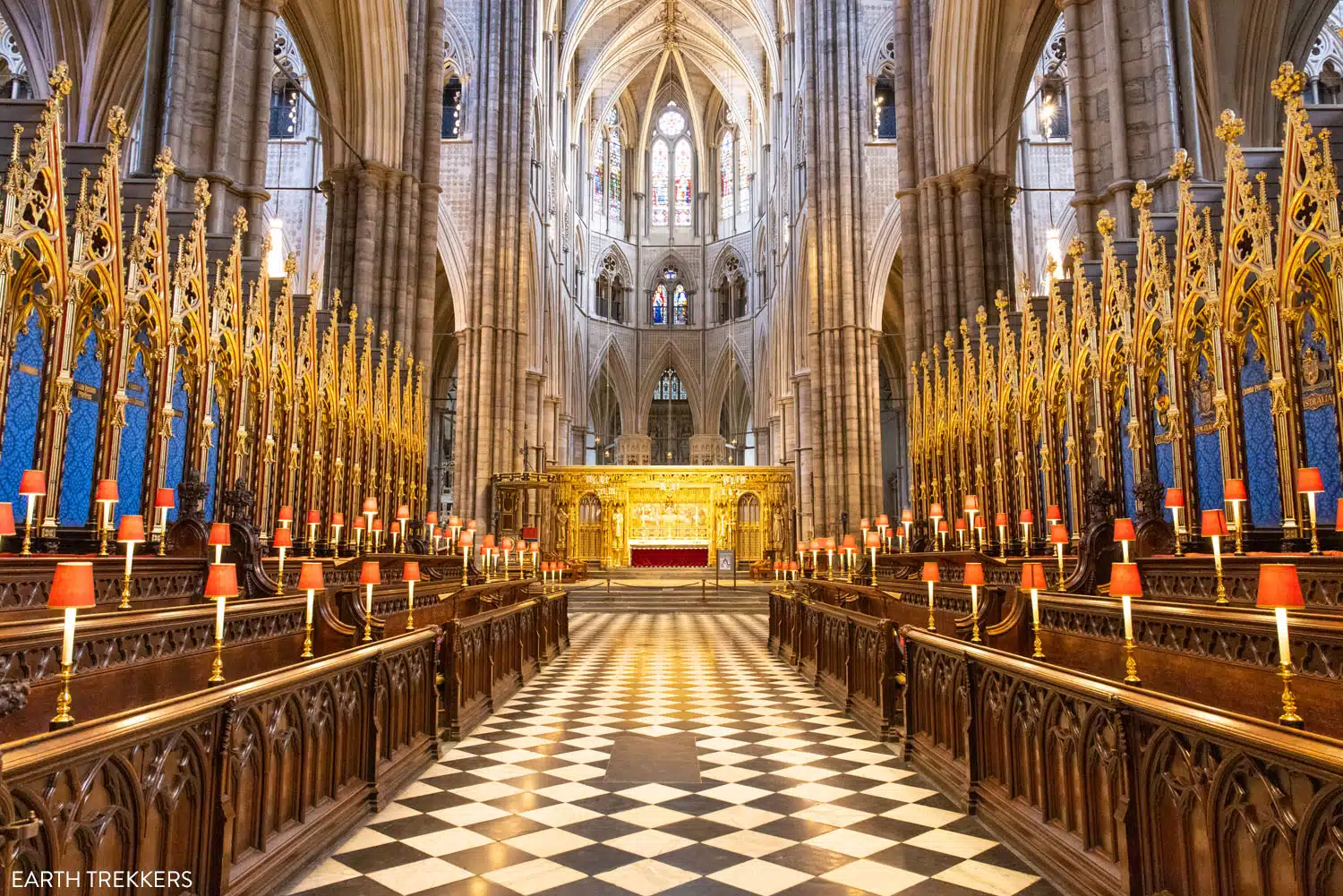
Westminster Abbey
Mont Saint-Michel. Located in northern France, this island is surrounded by medieval walls and topped with an ancient village and abbey. Most of the time it is surrounded by sand but when the tide is high, Mont Saint-Michel looks like a floating island.
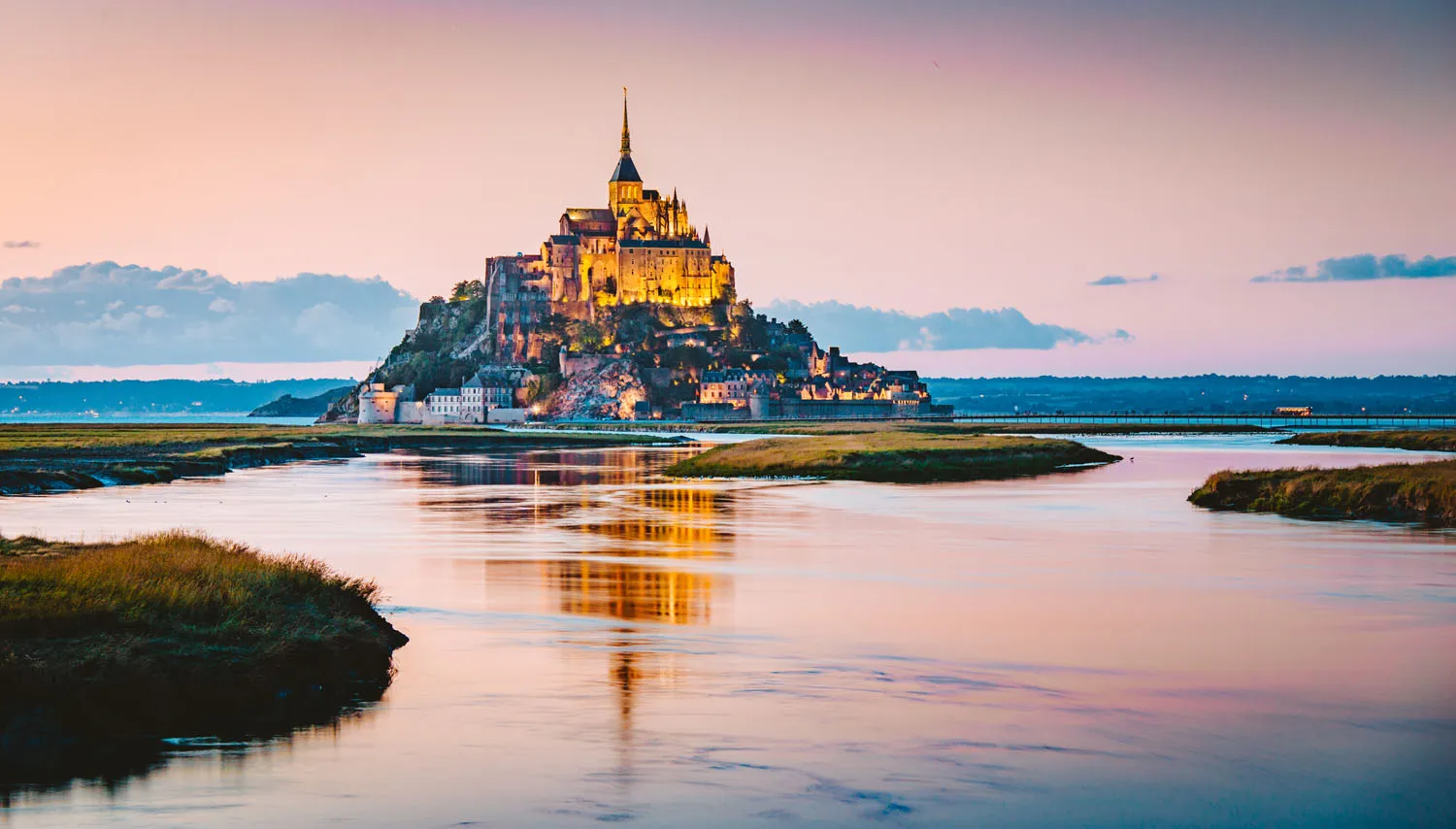
Mont Saint-Michel | shutterstock.com
Grand Place. This is the centerpiece of Brussels and one of the most beautiful squares in Europe.
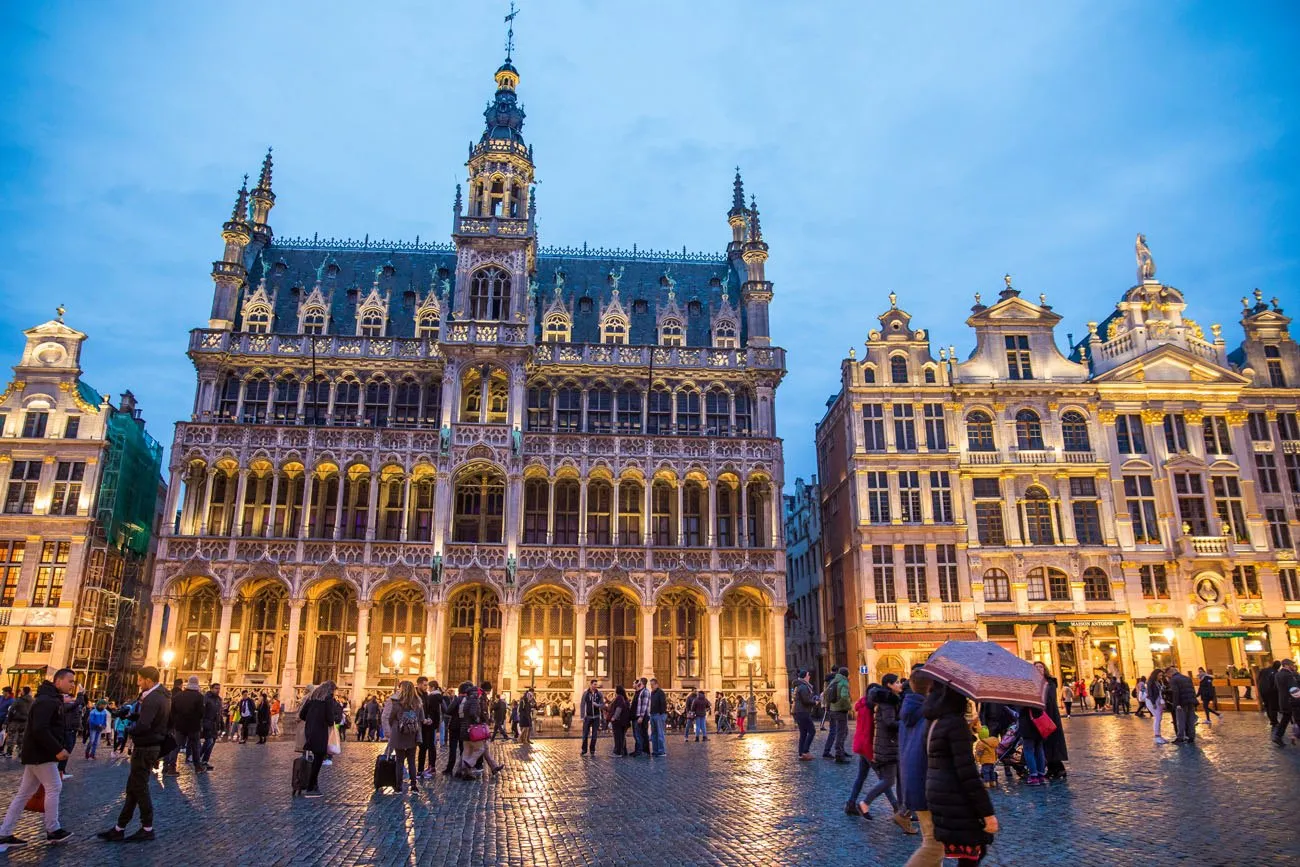
Grand Place, Brussels
Plitvice Lakes National Park. Located in Croatia, turquoise lakes, waterfalls, and boardwalk trails create one of the most unique parks to visit in Europe.
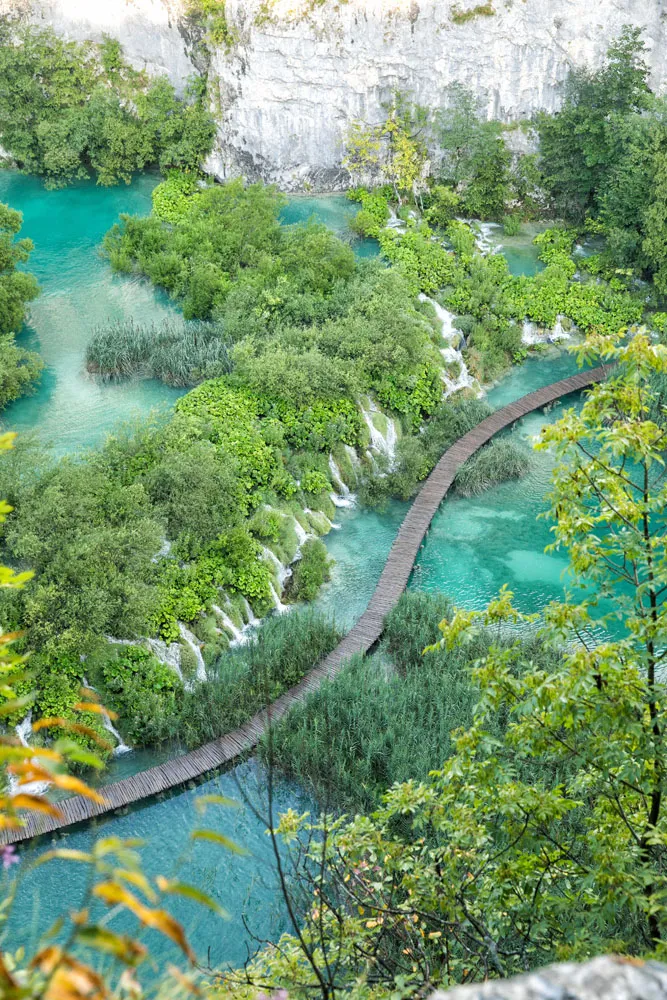
Plitvice Lakes
Jerónimos Monastery. This architectural masterpiece was built to celebrate Vasco da Gama’s successful voyage to India. Located in Lisbon, it is a UNESCO World Heritage Site and one of the Seven Wonders of Portugal.
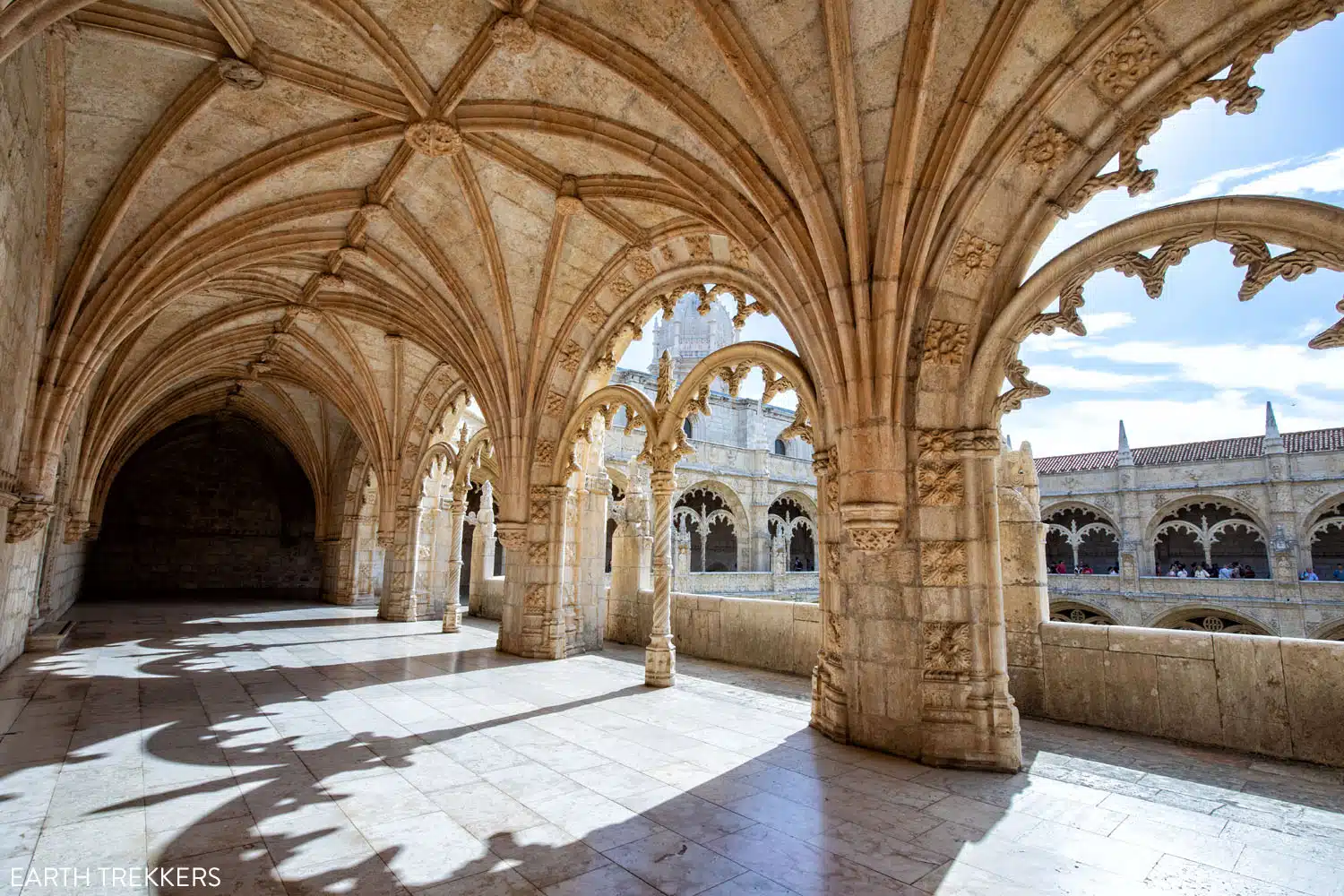
The cloister of Jerónimos Monastery
The Amalfi Coast. The Amalfi Coast is a stretch of coastline that runs along the Sorrentino peninsula in Italy. This is a popular vacation spot from late spring through early fall, with Positano, Amalfi, and Ravello being some of its most popular towns to visit.
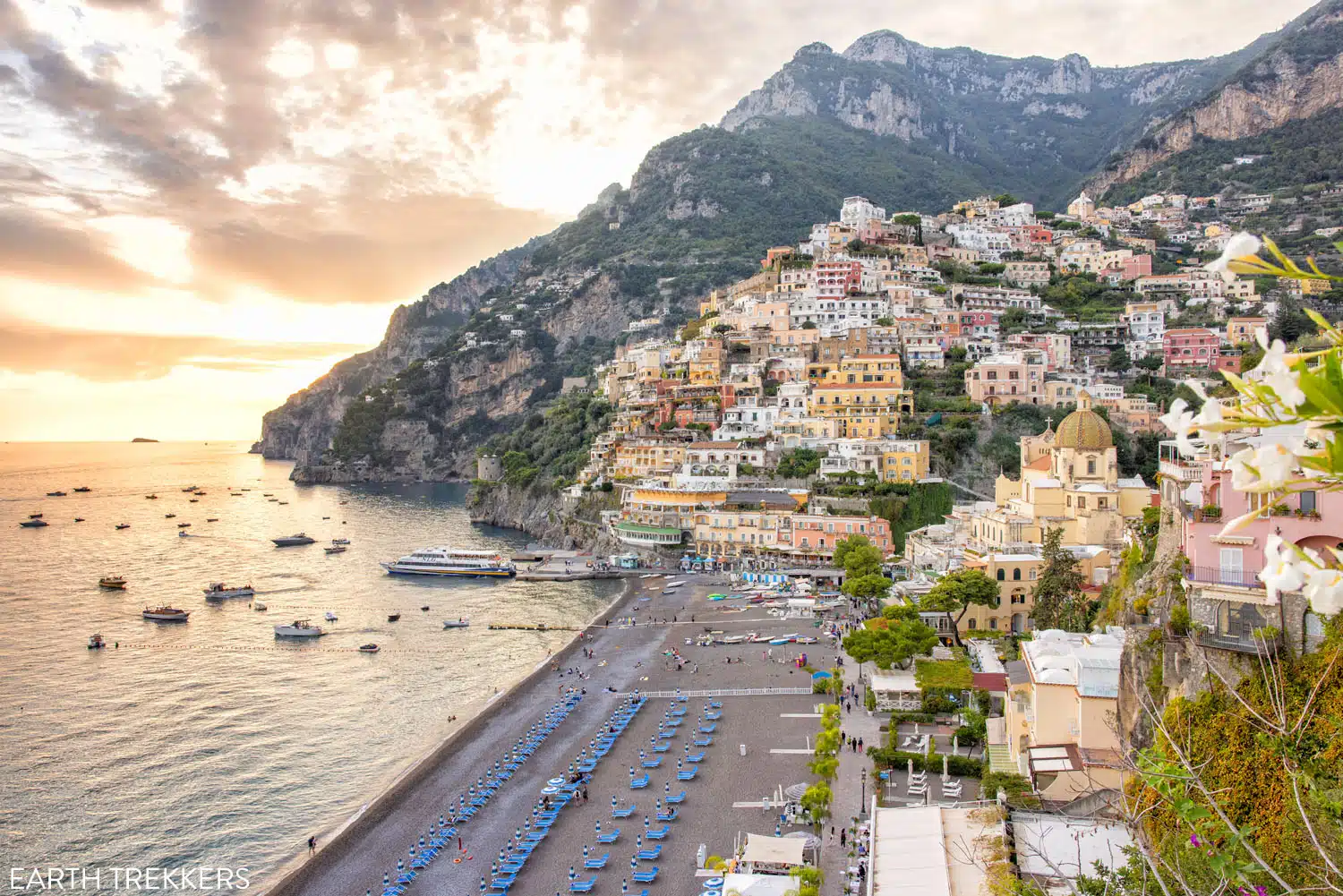
Positano, Amalfi Coast
Nyhavn, Copenhagen. Brightly colored buildings run along a canal, creating Copenhagen’s most photographed spot. It’s a must-see on a visit to the city, the starting place for many cruises of the harbor, and a scenic spot to have a meal in an outdoor café.
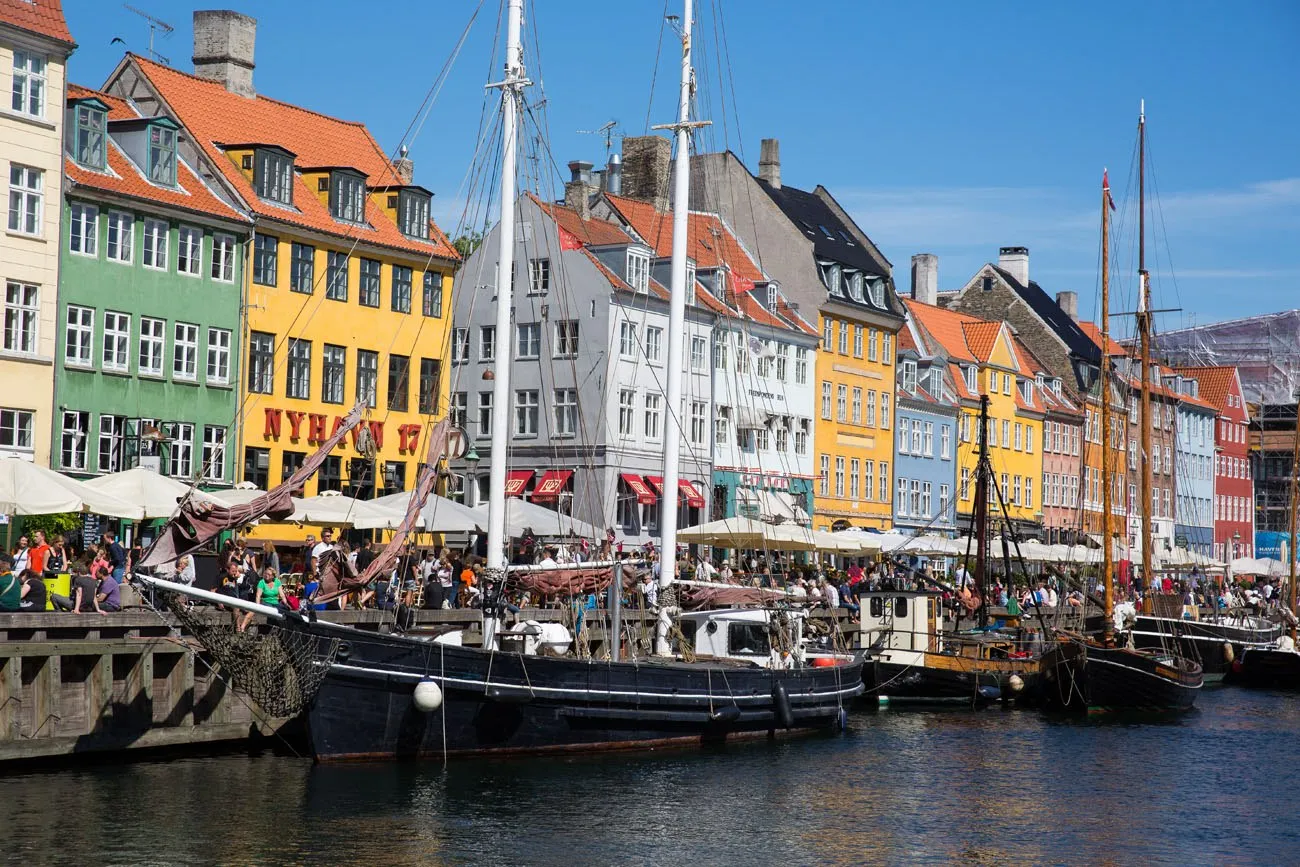
Nyhavn
Santiago de Compostela. This cathedral, which is located in northwest Spain, is famous for being the end point of the Camino de Santiago (the Way of St. James), a series of pilgrimage routes that have become one of Europe’s most famous long distance walking routes.
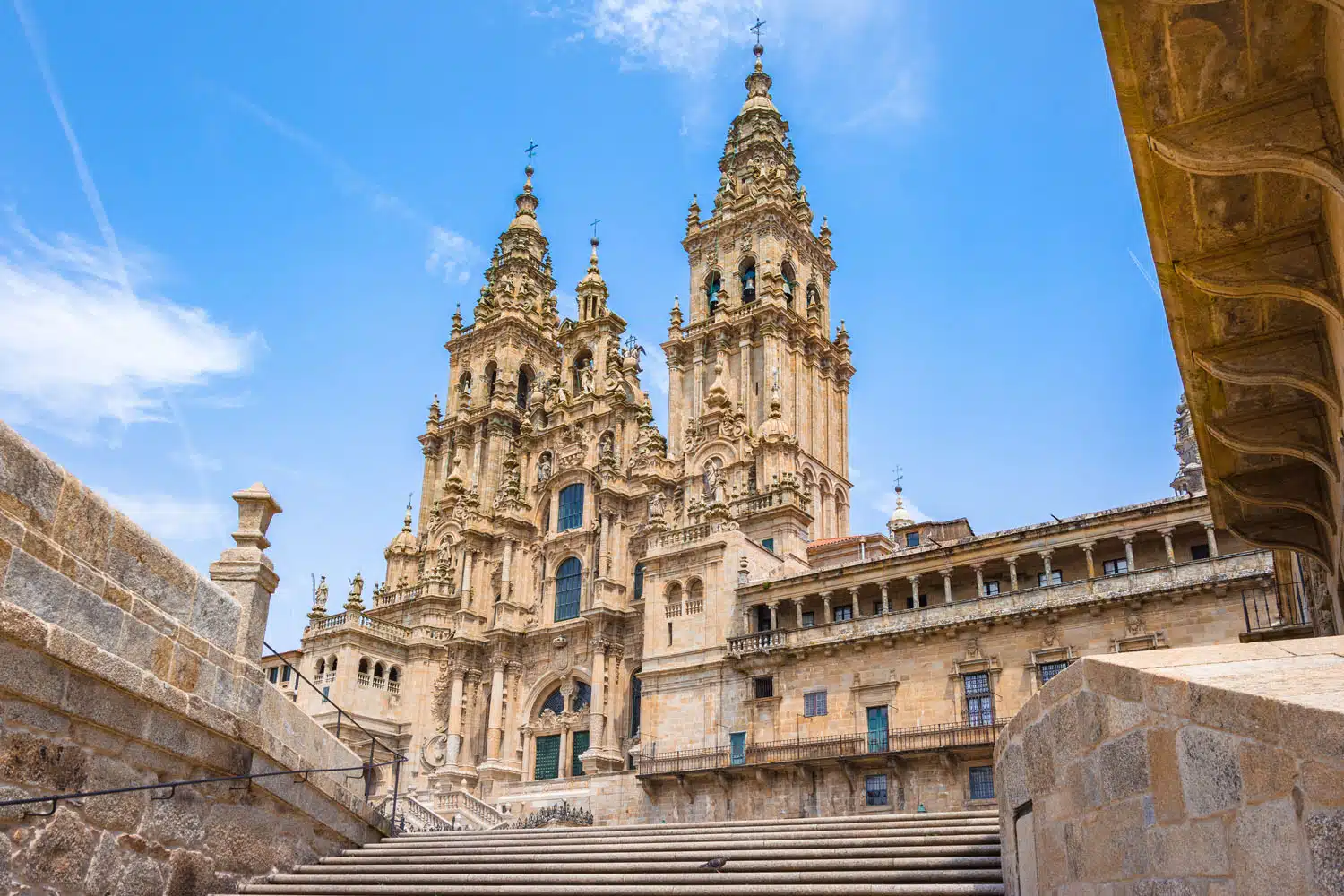
Cathedral of Santiago de Compostela | shutterstock.com
The Leaning Tower of Pisa. This is one of Italy’s most recognizable landmarks. Visitors can climb to the top of the tower and visit the cathedral, baptistery, and museums, all part of the Duomo Complex.
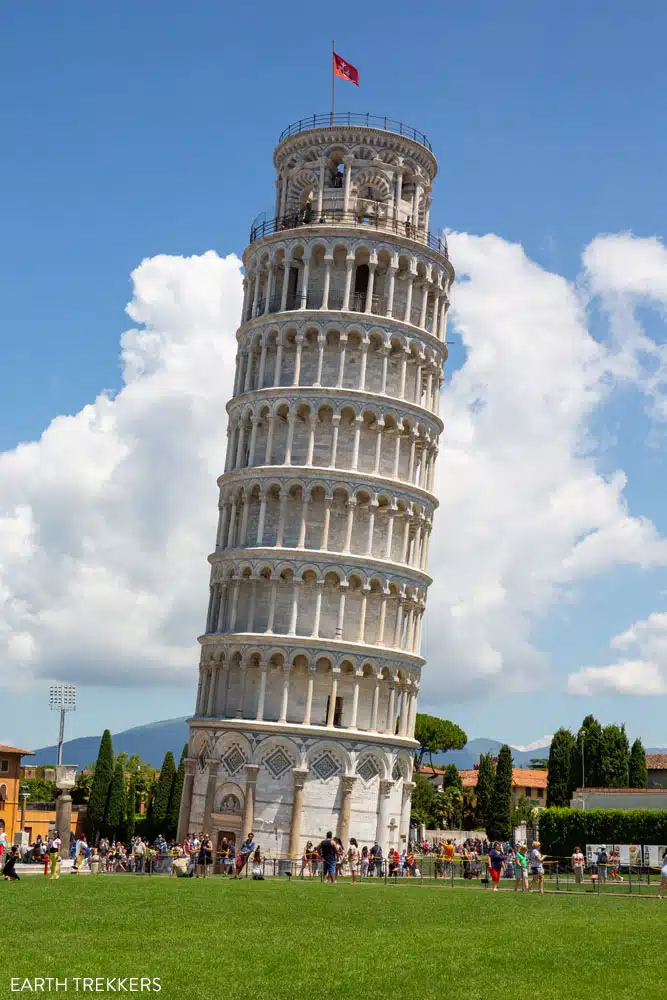
Leaning Tower of Pisa
Meteora. In northern Greece, six monasteries are perched on top of immense natural pillars. It is a UNESCO World Heritage Site.
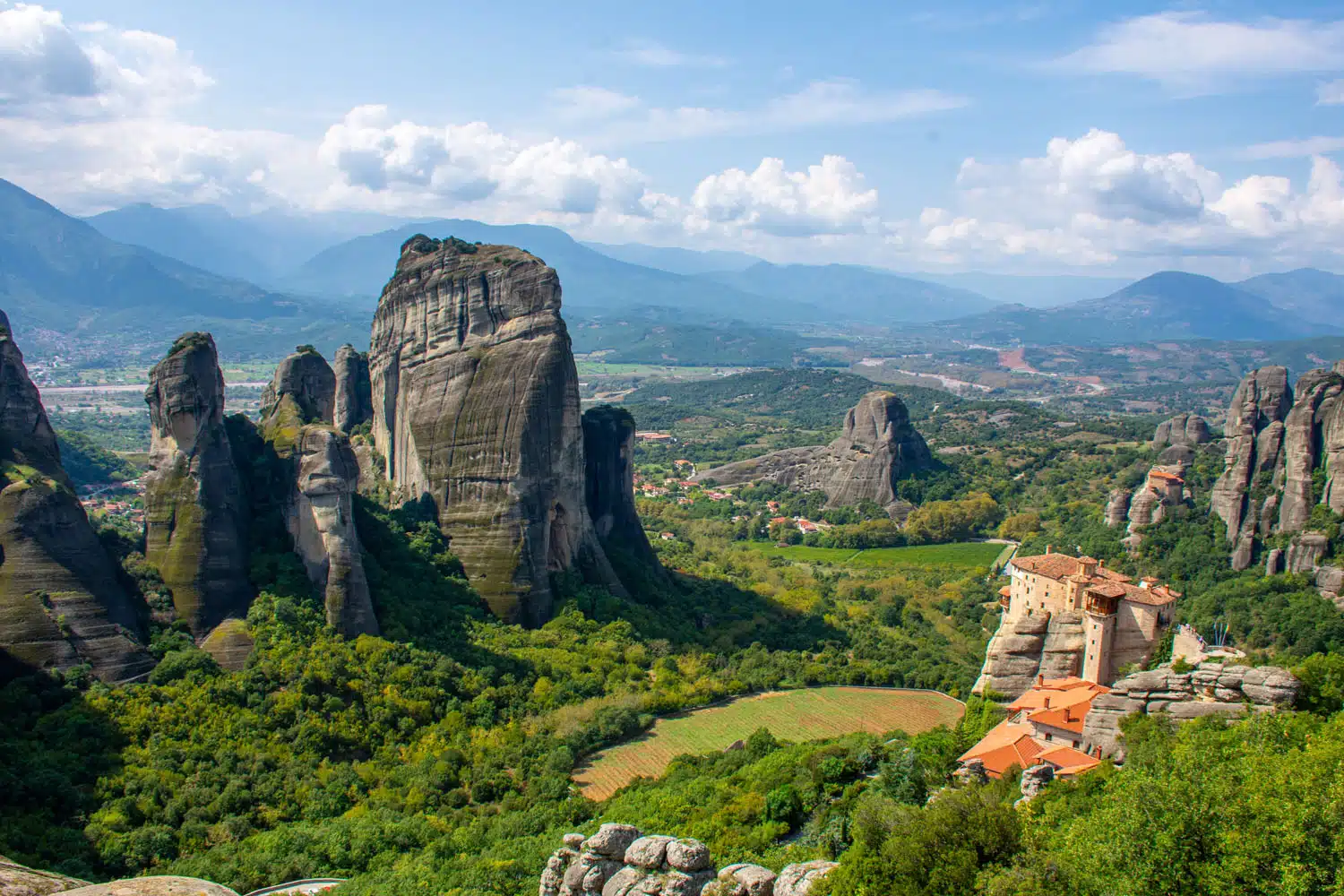
Meteora, Greece | shutterstock.com
Top Europe Tourist Attractions: On a Map
How to Use This Map: Click the icons on the map to get more information about each point of interest. To take this map with you, click the star next to the title of the map which adds it to your Google account. Next, within your Google Maps app, select ‘Saved’ and then select ‘Maps’. This map title will now appear in your list.
How to Plan a Trip to Europe
If you are a first-time visitor to Europe, we recommend starting with our article 7 Things to Know When Planning Your First Trip to Europe, which has many tips to help you plan your trip.
We also have quite a few Europe itineraries, many of which include one or more of the top attractions in Europe.
Whether you have one week or 10 days, here are two guides that list several options, a good start for picking an itinerary if you don’t really know where to go or how to put several cities together:
We also have a long list of itineraries in our Travel Itineraries page, but here are a few of the most popular:
- 10 Days in Greece: Santorini, Naxos, Mykonos & Athens
- 10 Days in Italy: Rome, Florence, Cinque Terre & Venice
- 10 Days in Portugal: 5 Ways to Plan Your Trip
- 10 Days on Iceland’s Ring Road
- 10 Days in Central Europe: Budapest, Vienna & Prague
- 10 Day Scotland Itinerary: Edinburgh, Glasgow & the Isle of Skye
- The Best of London & Paris in 10 Days
Frequently Asked Questions
What are the most visited attractions in Europe?
The most visited attractions in Europe include the Louvre, the Eiffel Tower, the Colosseum, the Acropolis, the Alhambra, the Palace of Versailles, the Prado National Museum, the Sagrada Familia, the Hofburg Palace, and the canals of Venice.
What to do with one week in Europe?
With one week in Europe, you have enough time to visit two big cities or one city and take day trips. A road through one small region can also easily be done if you have one week in Europe.
If you have any questions about the top tourist attractions in Europe let us know in the comment section below.
More Information for Your Trip to Europe
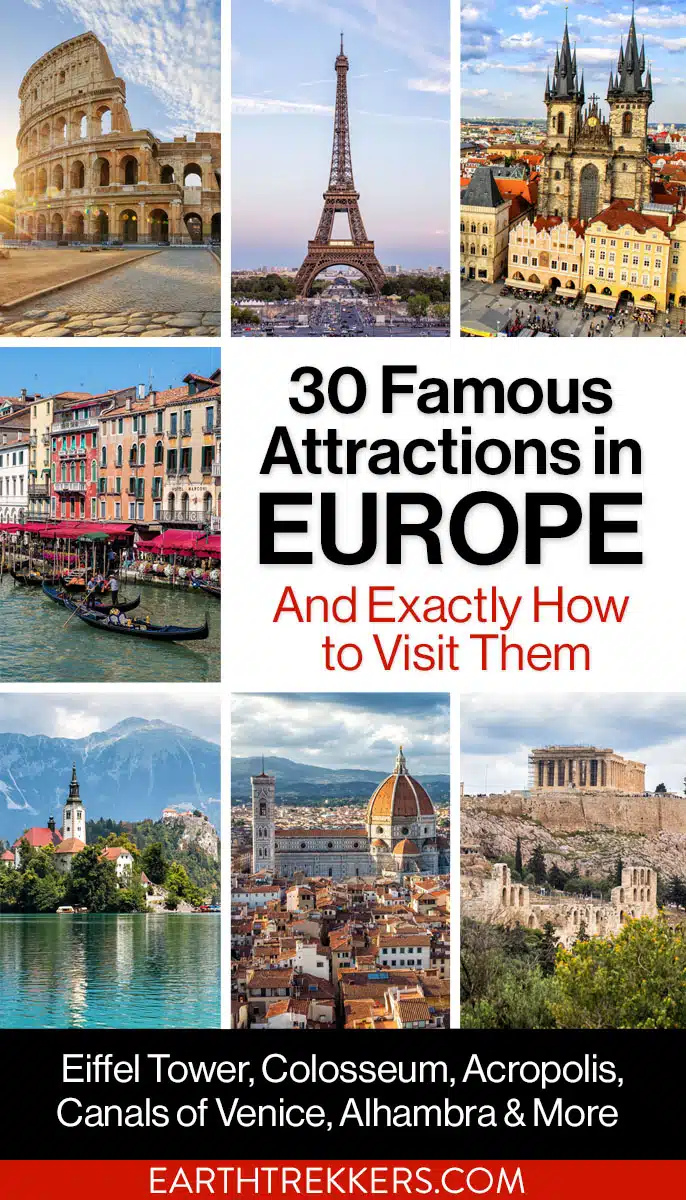
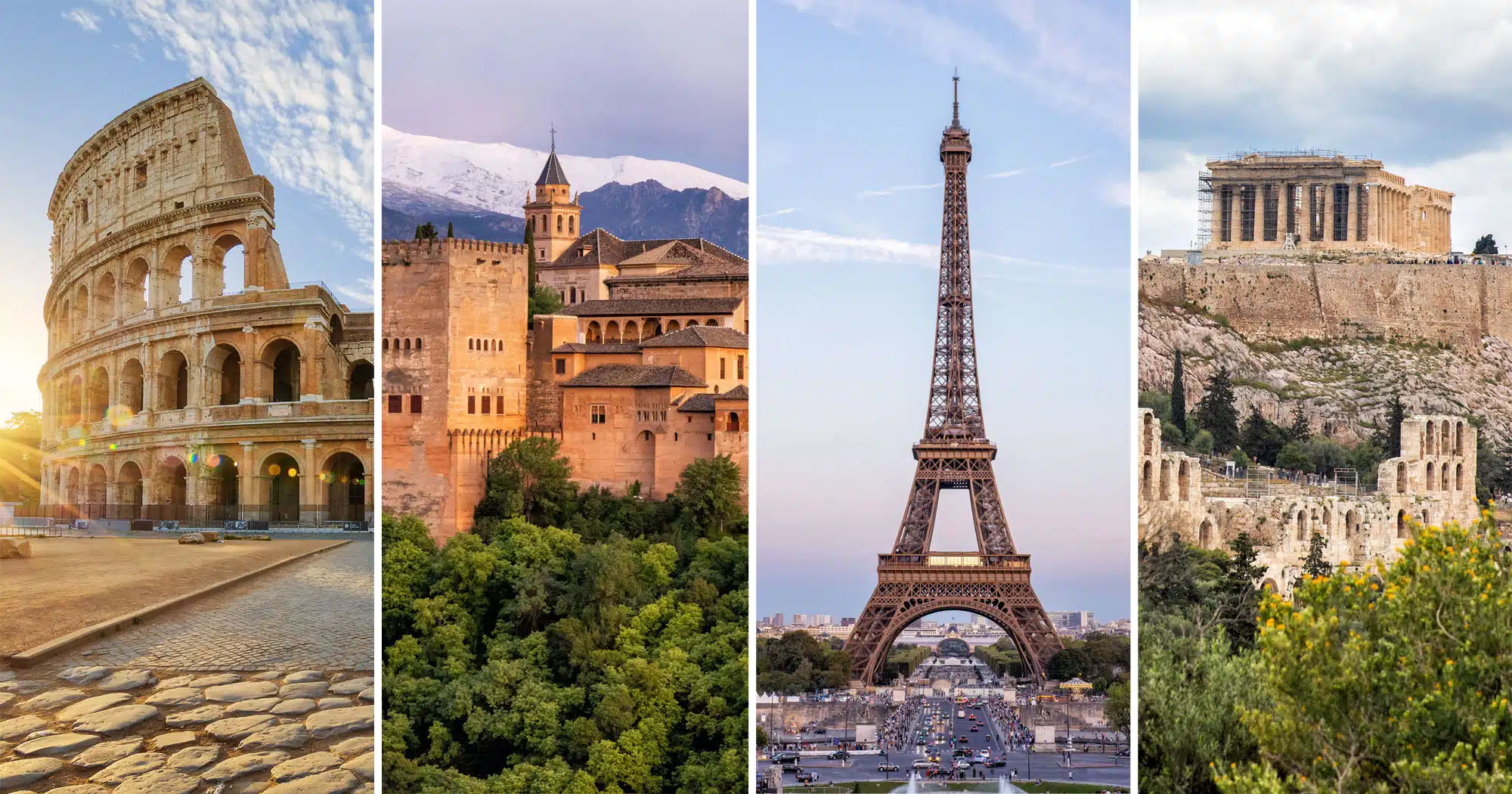

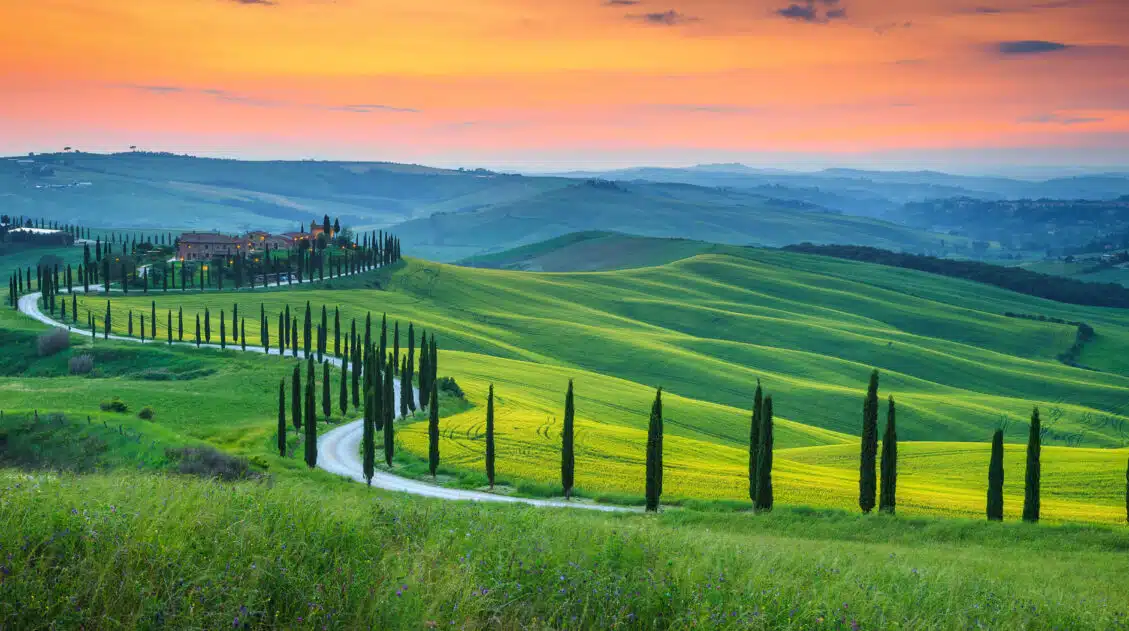
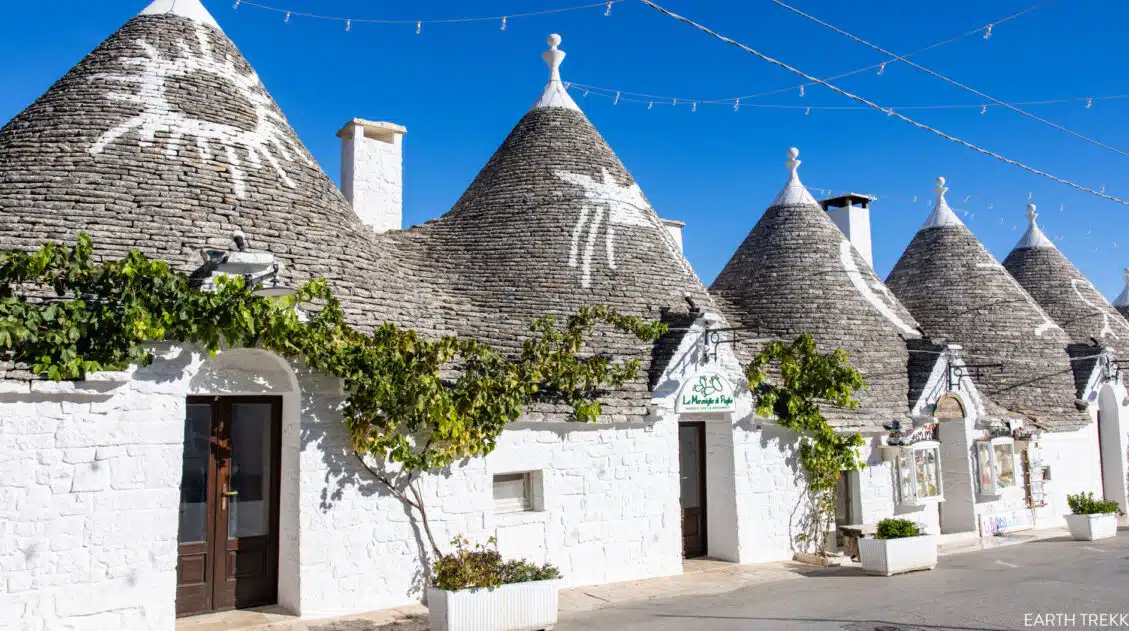
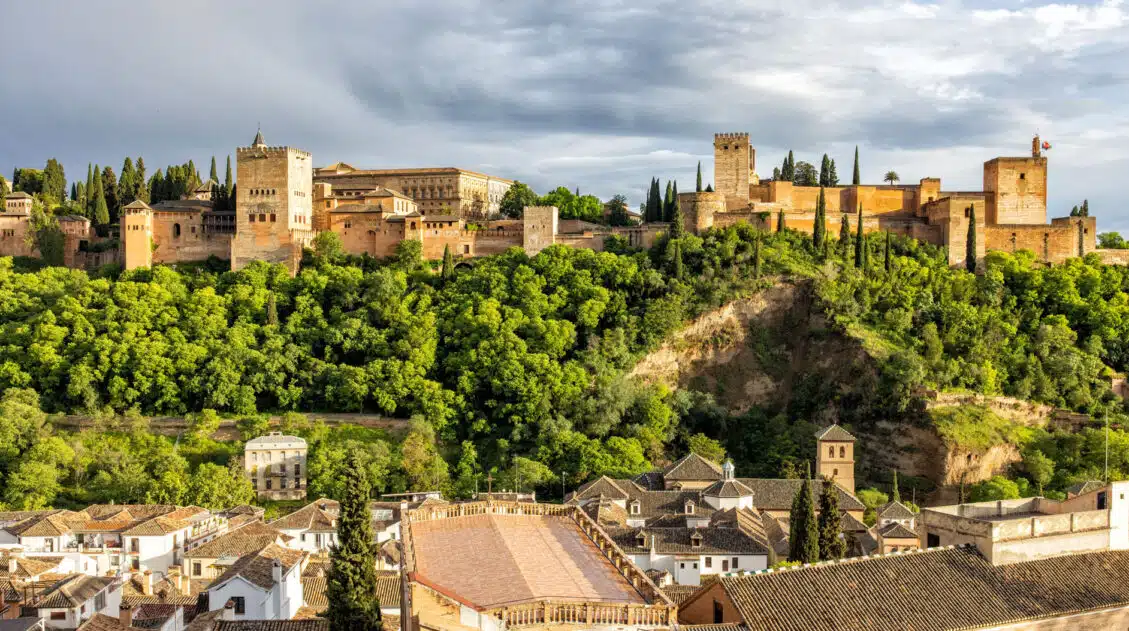

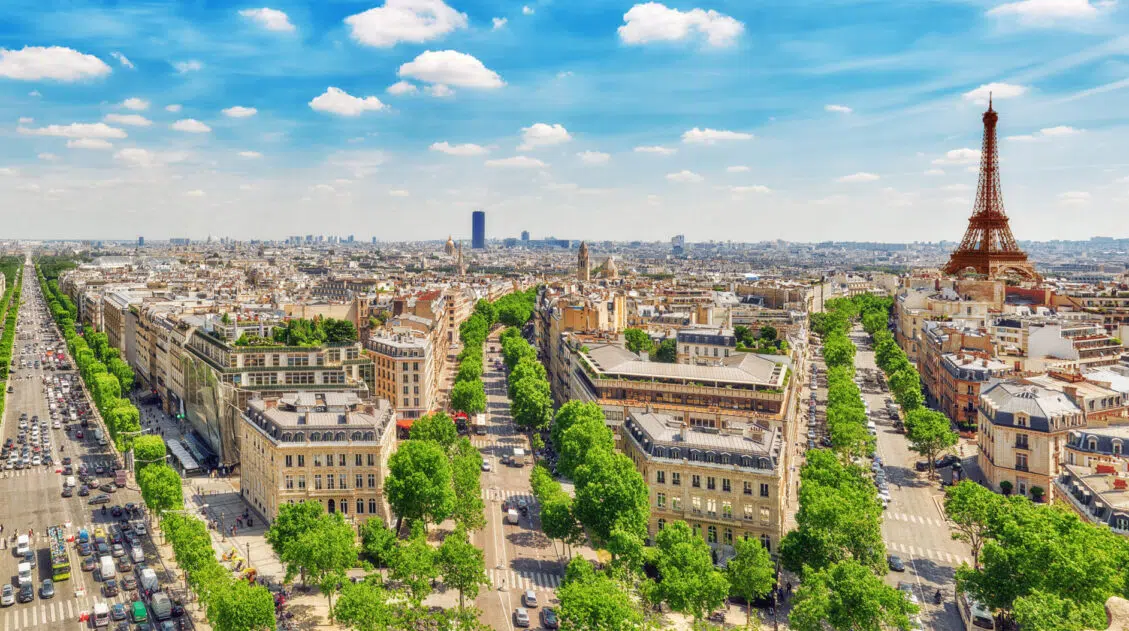
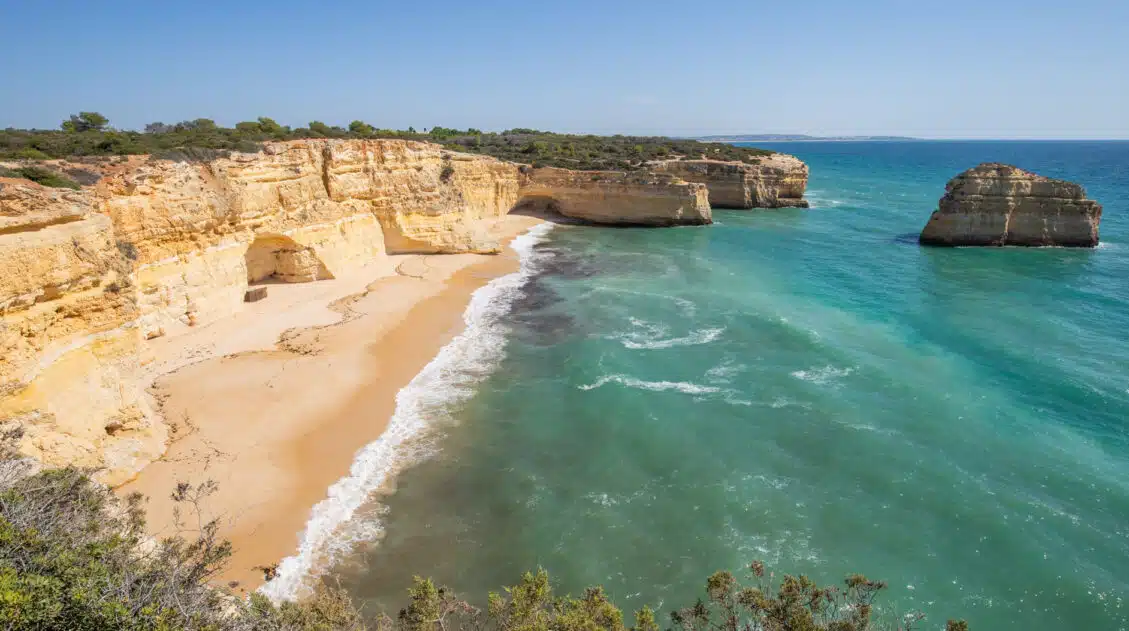
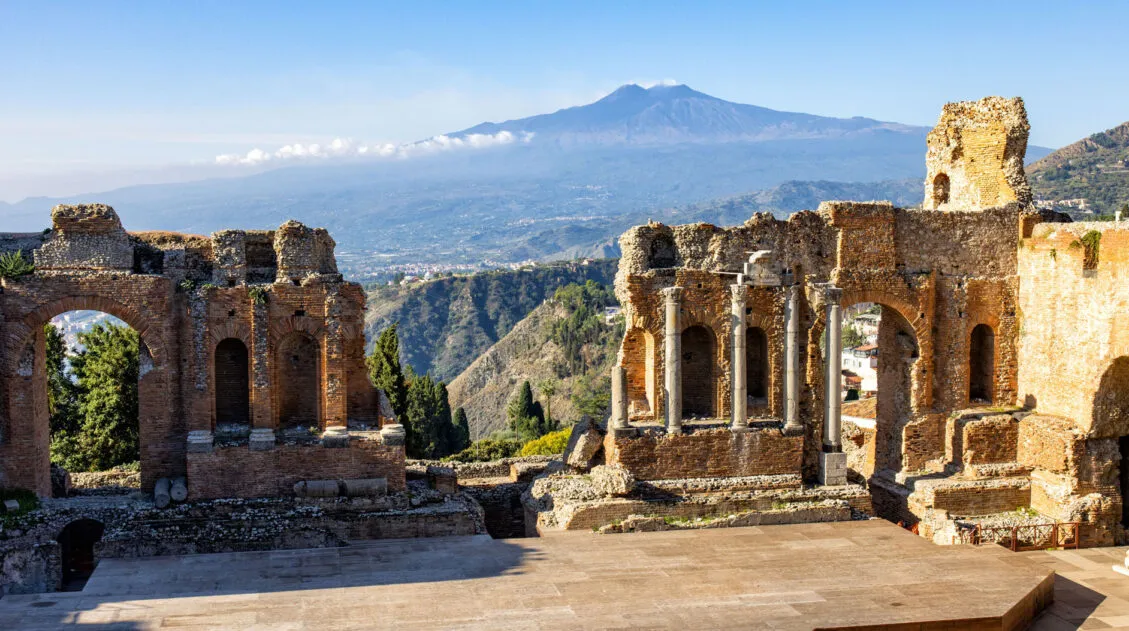
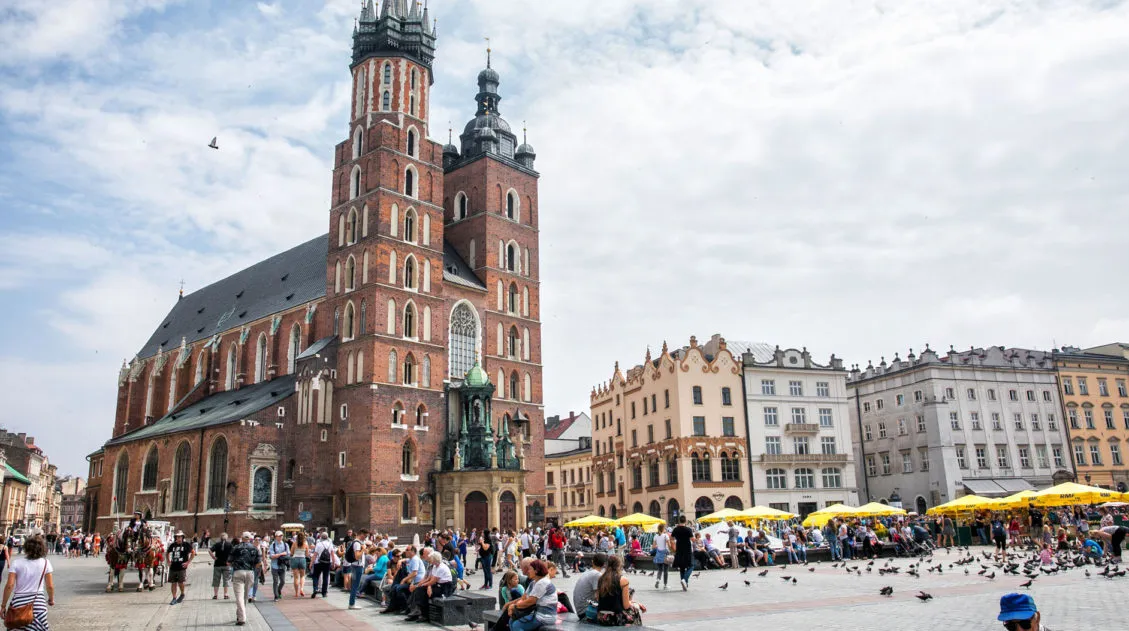
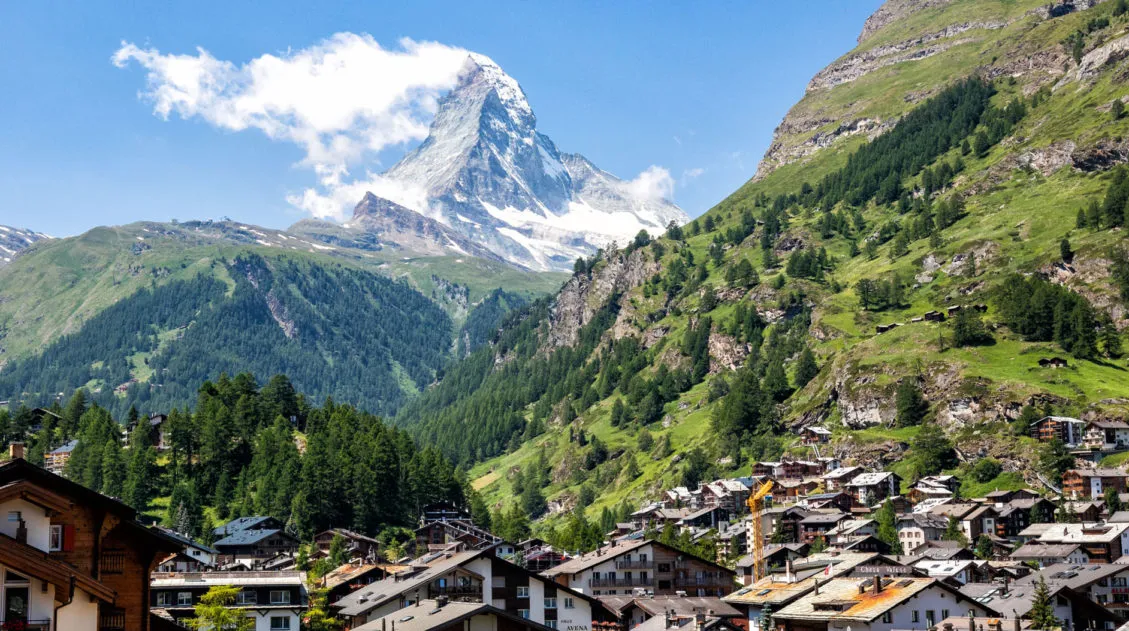

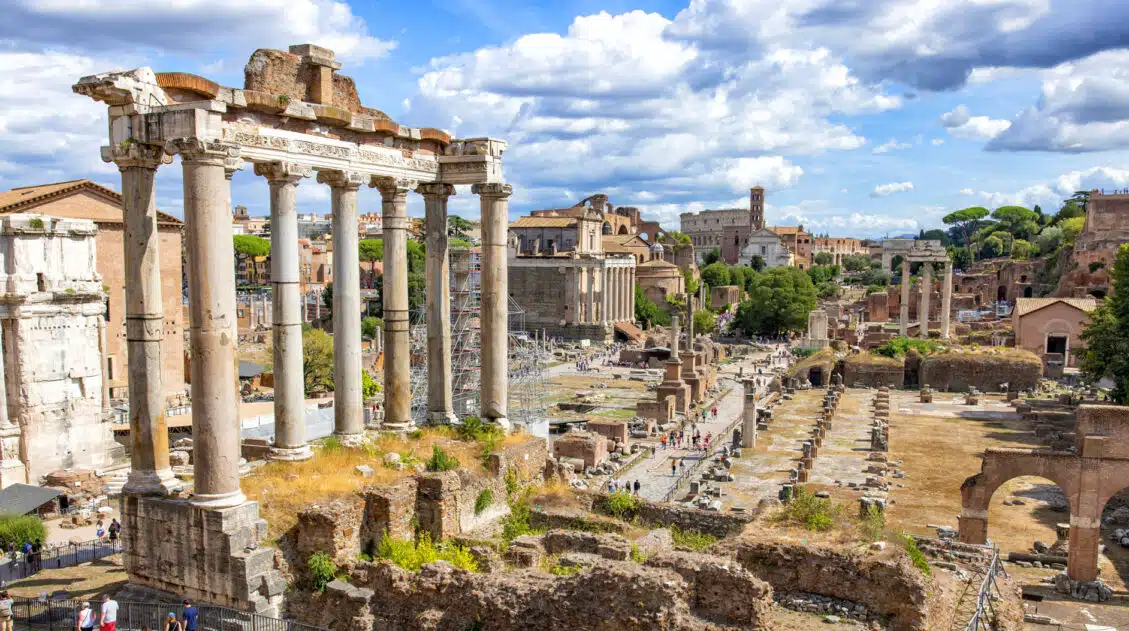
Comments 2